Zakelj Diary
Home Page: http://bbhhs96.dyndns.org/~zakeljdiary/
May 24, 2004
Life in the Refugee Camps
1949
By Anton Zakelj, translated and edited by John Zakelj
Introduction
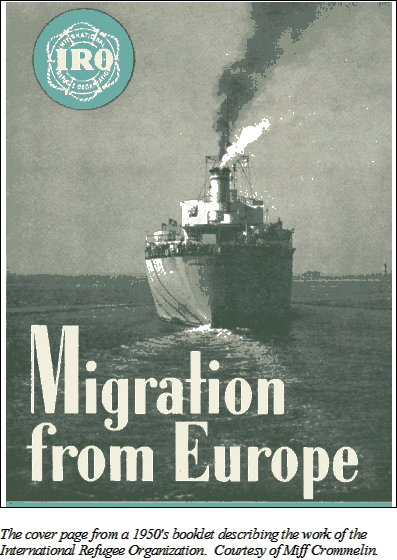 (Translator's comments:) As we began 1949, we were in
the Trofaiach Displaced Persons (D.P.) Camp, located near the city of Leoben,
Austria, about 50 miles southwest of Vienna. The camp was under the auspices of
the International Refugee Organization (IRO). At this point, it may be useful
for the reader to know more about the IRO and the situation in Europe at that
time. The following interesting article is from Miff Crommelin in Vancouver,
British Columbia. Miff's father, Edward Crommelin, worked for the IRO and the United
Nations Relief and Rehabilitation Administration
(UNRRA) from 1945 to 1952. This article is from the Stars and Stripes News
sometime in 1950:
(Translator's comments:) As we began 1949, we were in
the Trofaiach Displaced Persons (D.P.) Camp, located near the city of Leoben,
Austria, about 50 miles southwest of Vienna. The camp was under the auspices of
the International Refugee Organization (IRO). At this point, it may be useful
for the reader to know more about the IRO and the situation in Europe at that
time. The following interesting article is from Miff Crommelin in Vancouver,
British Columbia. Miff's father, Edward Crommelin, worked for the IRO and the United
Nations Relief and Rehabilitation Administration
(UNRRA) from 1945 to 1952. This article is from the Stars and Stripes News
sometime in 1950:
More than 750,000 people today are
becoming established in new homes in 80 countries throughout the world, thanks
to history's most outstanding example of international peace-time cooperation -
the United Nations' specialized agency, the International Refugee Organization.
Although World War II demonstrated the
ability of many nations to band together against a mutual enemy, the IRO has
best illustrated their capacity to cooperate smoothly in peacetime, without the
stimulus of a common threat to their individual security.
The work of the IRO in the three years
since it was started has produced hundreds of administrative, operational,
social, financial, political and diplomatic problems. All have been settled by
negotiation, conference and compromise within the organization to the
satisfaction of all nations involved, and to the permanent benefit of more than
1,000,000 persons uprooted and displaced by the last war and the political
upheaval that followed it.
From our standpoint as refugees, things
didn't work quite as smoothly as the description in the Stars and Stripes
article. Nevertheless, throughout 1948 and 1949, we were finally beginning to
see resolution of the uncertain and dangerous situation that so many of us had
been in since the Communists took over our homeland in 1945.
Saturday, January 1, 1949, in the Trofaiach D.P. (Displaced Persons ) Camp near Leoben, Austria
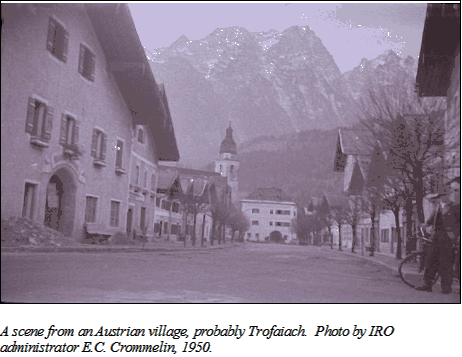 The Trofaiach D.P. Camp is located about a half hour's
walk from the market ("trg") in Trofaiach. During World War I, this
was the site of a gunpowder factory for the Austrian Army. When Austria (and
Germany) lost that war, the machinery for manufacturing the gunpowder was
apportioned among the new countries that were formed after the war. All the
buildings were destroyed and only the foundations remained. During World War
II, the Germans built barracks on this site for their Ostarbeiter, workers
whom they had forcibly relocated from Eastern Europe (mostly Ukrainians). On
this site, the Germans also built a crematorium to burn the bodies of workers
who died.
The Trofaiach D.P. Camp is located about a half hour's
walk from the market ("trg") in Trofaiach. During World War I, this
was the site of a gunpowder factory for the Austrian Army. When Austria (and
Germany) lost that war, the machinery for manufacturing the gunpowder was
apportioned among the new countries that were formed after the war. All the
buildings were destroyed and only the foundations remained. During World War
II, the Germans built barracks on this site for their Ostarbeiter, workers
whom they had forcibly relocated from Eastern Europe (mostly Ukrainians). On
this site, the Germans also built a crematorium to burn the bodies of workers
who died.
(In 1986, my son and I visited Trofaiach. At
first, we had a hard time finding the site of the D.P. Camp because nobody
could remember it. Finally, when we asked about the old gunpowder factory,
people remembered the location. When we arrived there, we found that a youth
camp had been built on the site of the former D.P. Camp.)
Today, January 1, 1949, we're taking turns
praying in the chapel to make sure we always have someone praying 24 hours a
day, 7 days a week. Last night, I didn't sleep well because I was worried I
would miss my turn at 3:30 a.m. I finally fell asleep and then woke a few
minutes late. I prayed in the chapel from 3:35 to 4:30 a.m., 30 minutes longer
than planned to make up for being late. We are praying for a new home where we
will be safe and free.
About 5 inches of snow fell last night. At 8
a.m., I went to Mass. At 2 p.m., we had a special New Year's dinner: soup,
potatoes, pork, cider and a little red wine. I bought a bottle of red wine
yesterday for 21 Schillings.
Baby Janko is 4 and a half months old and
weighs 16 pounds. Our friends' daughter Jolanda is 15 months old and weighs
only 17 pounds due to her health problems.
Sunday, January 2, 1949
At 11 a.m., the Slovenians in the camp were
supposed to elect new representatives to participate in the camp
administration, but nobody came. I was asked to replace Gutovnik, who will be
leaving for Argentina, but I refused, and nobody else wants to run. Camp
administration is thankless work, always full of controversy . And, with so
many people leaving regularly for other countries, it's hard to maintain any
continuity.
Monday, January 3, 1949
About 300 refugees left for Argentina this
morning, including about 70 Slovenians; among them were Rot, Mejac, Svenšek,
Kovac, Gutovnik, Primozic, Košir, Mocnik, Cukjati, Meden, Zlatar, Fradl, Fišer,
and Est with their families and some students from Gradec (Graz). Not one of
them is glad to be going to Argentina. They wish they could go back home to
Slovenia - but not to slavery, suffering and death.
I canceled my subscription to the
"Morning News." Reading the "Morning News" has helped me
learn to be a fluent reader of English and even a decent writer.
Tuesday, January 4, 1949
After 15 months, the doctor is no longer
prescribing milk for my ulcers, which means that I must be healthy now.
I sent a 20 pound package to my brother Joze
in Slovenia, where basic necessities are still very hard to get. I received
letters from my sister Mici and my father. Cilka got a letter from her friend
Ivanka Zakomeli.
I bought a new suit from Spreitzer for 470
Schillings.
Wednesday, January 5, 1949
I began studying Spanish, in case we will go
to Argentina.
This evening, the men were working, so only
the women participated in the traditional procession and blessing of homes on
the evening before the holy day of the Three Kings.
Thursday, January 6, 1949
We went to Mass at 7 a.m. Rev. Malavašic says
the holy day of the Blessed Three Kings is one of the most important holy days,
but it's not recognized here in Austria. We didn't have any special food today
- for lunch we had sauerkraut and a piece of bread, for supper we had peas.
Friday, January 7, 1949
I received a 30 pound package of food from
Mlinar, worth 220 Schillings. My friend Karl had said he would pay for the food
from Mlinar, but now he can't afford it.
Saturday, January 8, 1949
I have started doing camp work again. Today I
shoveled coal - very tiring work.
Sunday, January 9, 1949
I wrote a letter to Dr. Krek, asking his help
in finding Karl's uncle in America.
Monday, January 10, 1949
Last night, at 12:30 a.m., they took Angela
Filipic to the Leoben hospital to give birth. She had been complaining of pain
for some time, and she has been long overdue.
In the evening, I attended Spanish class. It
went well!
Tuesday, January 11, 1949
Angela Filipic died in the Leoben hospital
last night at 11 during childbirth, but her baby, a boy, survived. Her husband
Marjan was here in the camp, waiting anxiously for news about the birth, but
the hospital didn't send word until 1 p.m. today. A nurse arrived with the news
10 minutes after Marjan had left to go to the hospital. So he got the news when
he arrived there. He returned to the camp at 5 p.m., in complete despair.
This tragedy has shaken me deeply. What if
this had happened to Cilka? I would feel responsible for her death for the rest
of my life.
Wednesday, January 12, 1949
Marjan stayed in our room till 11:30 last
night. After that, I couldn't sleep all night.
 At
8 a.m., Marjan and I took the bus to Leoben. In the hospital, we saw his dead
wife - on the dissection table. We picked up her things and then went to the
government offices to arrange for the transport and burial of her body, but we
weren't able to accomplish anything because the necessary papers weren't signed
yet. We returned to the camp at 10 a.m., and took the train back to Leoben at 2
p.m., but still could not make any arrangements. The doctor who had examined
Angela's body had left without signing the papers. When we returned to the
camp, we saw Mr. Šepin (Angela's uncle), who had just arrived from Celovec
(Klagenfurt) with his two daughters.
At
8 a.m., Marjan and I took the bus to Leoben. In the hospital, we saw his dead
wife - on the dissection table. We picked up her things and then went to the
government offices to arrange for the transport and burial of her body, but we
weren't able to accomplish anything because the necessary papers weren't signed
yet. We returned to the camp at 10 a.m., and took the train back to Leoben at 2
p.m., but still could not make any arrangements. The doctor who had examined
Angela's body had left without signing the papers. When we returned to the
camp, we saw Mr. Šepin (Angela's uncle), who had just arrived from Celovec
(Klagenfurt) with his two daughters.
This evening, Štrukelj began a collection to
pay for the transport and burial.
Thursday, January 13, 1949
Marjan and the Šepin family went back to Leoben
to arrange for transportation of Angela's body back to Trofaiach. After paying
a driver 200 Schillings, they returned with her body before noon. Štrukelj and
I went around the camp all day, asking for contributions. We collected 498
Schillings. I cried frequently; no other tragedy has shaken me as much as this
one.
This afternoon, I went to the Health
Commission for a required exam. Dr. Meršol is one of the three IRO doctors.
They decided I am not healthy enough for hard physical labor, but good enough
for skilled labor and for emigration.
In the evening, there was an announcement
over the camp's loudspeaker that the funeral would be at 3:30 tomorrow.
Friday, January 14, 1949
Marjan Filipic and Toncka Šepin brought his baby
boy from Leoben around noon today. He was immediately baptized and christened
Andrej. During the afternoon, he slept in our room, and people came to look at
him.
At 3:30 p.m., Angela's body was buried in the
Trofaiach cemetery next to the chapel, in the presence of a large number of
Slovenians and others. Marjan's farewell to his wife was deeply moving.
At 8:30 p.m., the Šepin family returned to
Celovec with Marjan and his 4-day old baby Andrej. Marjan will return here next
Monday.
Saturday, January 15, 1949
This morning, I cut firewood with Karl. In
the afternoon, I looked for others to help with the camp work.
Sunday, January 16, 1949
A heavy snowstorm blew all night. I got up
twice to close doors and windows which the wind had blown open. Our entryway is
full of snow.
The Spreitzer family left for Holland today.
Mr. Spreitzer is originally from there. He had married a Slovenian woman; they
were living and working in Slovenia when the war ended, and wound up as
refugees with the rest of us. As Mrs. Spreitzer was leaving, she gave us some
kitchen supplies and thanked us for teaching her how to make bobbin lace.
Monday, January 17, 1949
Marjan returned from Celovec.
Today is my father's 70th birthday. I wish I
could be with him at home in Slovenia.
Friday, January 21, 1949
Gross tried to fix my radio, but couldn't
because our electricity kept going out. The transformer for the camp overloads
and shuts down frequently.
Saturday, January 22, 1949
Another snowstorm last night and all day
today. Marjan returned to Celovec to see his baby and his wife's relatives.
Sunday, January 23, 1949
Engineer Karlin and Mr. Lorber, who work in
the camp administration, offered me the job of assistant Quartiersmacher
(quartermaster) with a monthly salary of 250 Schillings, beginning February 1.
If I were healthier, I would seek better-paying work elsewhere , but I feel I
have to take this job.
Monday, January 24, 1949
Cilka and I were vaccinated against typhus
today. Almost all children under 18 are being vaccinated against tuberculosis,
but they have not included our 5-month old baby Janko as yet.
Tuesday, January 25, 1949
Tomaz Pivk sent me an accordion which my
brother Joze had left with him. Karl says it's worth more than 500 Schillings.
Wednesday, January 26, 1949
The camp gives us points which we can
exchange for goods in the camp store. I exchanged about a month's worth of
points for a pair of galoshes, a shirt and socks.
Thursday, January 27, 1949
There will be no further emigration to
Argentina for the time being. The IRO is trying to force the Jesenko family to
emigrate to Brazil.
This evening, I went to an English class. We
had a contest between two groups, and my group won 16 to 14. I was the best in
our group, maybe because I got easy questions.
Friday, January 28, 1949
Our friends' 15-month old daughter Jolanda is
beginning to walk.
Saturday, January 29, 1949
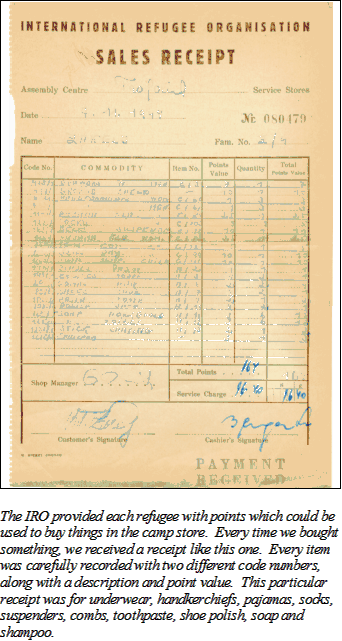 Cilka's sister Manica writes from Slovenia that my sister
Julka might come visit us. We also received a letter from Helen, a friend who
went to Argentina. She says they are doing well, but are having problems
because they don't know Spanish. She also writes that they have had some
success in selling bobbin lace for borders on curtains and tablecloths, but
they can't find any buyers for larger, more expensive pieces. (We had been
hoping that, wherever we go, we could get some income by making and selling
bobbin lace.)
Cilka's sister Manica writes from Slovenia that my sister
Julka might come visit us. We also received a letter from Helen, a friend who
went to Argentina. She says they are doing well, but are having problems
because they don't know Spanish. She also writes that they have had some
success in selling bobbin lace for borders on curtains and tablecloths, but
they can't find any buyers for larger, more expensive pieces. (We had been
hoping that, wherever we go, we could get some income by making and selling
bobbin lace.)
Sunday, January 30, 1949
Nice day. Cilka and I went for a walk in the
woods on the nearby hillside.
Monday, January 31, 1949
We received our second vaccinations against
typhus. Another snowstorm outside.
I asked engineer Karlin about the job I was
promised. He said the major (the camp commander) hired a Russian, but Karlin is
not happy with him. He will arrange for me to get the job, but it won't begin
February 1 as we had expected.
February
1949
Tuesday, February 1, 1949
This evening, we met with Frank Lorber, who explained the possibilities of emigration to Canada, Brazil, Australia and New Zealand. He recommends emigrating anywhere, the sooner the better.
Wednesday, February 2, 1949
We went to Mass this morning in celebration
of Candlemas, the feast day of St. Blase.
This evening I went to English class from 7 -
8, and Spanish class from 8 - 9.
Thursday, February 3, 1949
I took my turn praying in the chapel from 11
p.m. to midnight. The chapel was very cold. Outside it's - 4F.
Saturday, February 5, 1949
We each received a loaf of white bread, for
the first time in a long time. For lunch, we usually get cabbage, peas, polenta
or barley porridge with beans.
Sunday, February 6, 1949
I wrote to the national bank for permission
to send my brother's accordion back to him in Slovenia. I also took care of
business correspondence for a number of friends and relatives. I have become
like a "clearinghouse."
Tuesday, February 8, 1949
Jernej Zupan thinks I should write to Dr.
Krek and ask him to help us emigrate to the United States.
Thursday, February 10, 1949
I received my first ration card for milk in
40 days. The doctor prescribed milk for my ulcers again, but the card lay in
the clinic for the past 10 days.
Friday, February 11, 1949
We received 200 pounds of coal for our
barracks.
The national bank denied my request for
permission to send my brother's accordion back to him in Slovenia.
Saturday, February 12, 1949
After three weeks of repair, I finally
received my radio back, but it still doesn't work right.
Monday, February 14, 1949
We received a letter from our brother-in-law
Mire in Canada. He says he was sick and had to spend all his savings. Now he's
working in a factory. He has not been able to sell a single piece of the bobbin
lace we had sent him. We had hoped this might be a source of income for us.
I was the only one at Spanish class this
evening. Since Argentina is not accepting applications, nobody wants to learn
Spanish.
Cilka was informed she will not be receiving
extra food rations any longer, since our baby Janko is now 6 months old.
The following families received approval to
emigrate to Canada: Hribar, Zorc, Levicar and Zonta.
Tuesday, February 15, 1949
There were 12 people at English class this
evening. I was still the only one at Spanish. Our teachers are very demanding.
Wednesday, February 16, 1949
For the first time, our baby Janko said,
"Ata, teta."
We received two packages from our friend
Paulin in New York. The packages included food, which we are very happy to use
here, especially lard; and old clothes, which I send on to our relatives in
Slovenia, and which they are very happy to receive. The packages also included
3 Reader's Digests, which I enjoy reading and which helps me practice my English.
Friday, February 18, 1949
We received a letter from our friend Vinko in
Canada. He sent one dollar for our baby Janko and one dollar for our friends'
little girl Jolanda.
237 people left the camp for Brazil today.
There were no acquaintances in this group.
Saturday, February 19, 1949
I bought an American dollar for 36
Schillings. Later, I sold the same dollar for 40 Schillings.
Monday, February 21, 1949
We received firewood for the month of March. I
gave some of our coal to Miller in exchange for more firewood.
Thursday, February 24, 1949
33 people left for Canada today, including
Mimi Albiani and her children.
The New Zealand immigration commission
visited our camp.
Friday, February 25, 1949
The group that was planning to emigrate to
Canada (Levicar, Zorc and Zonta) has been told they cannot leave because
Levicar can't get approval from the Field Secret Service. They were supposed to
go meet with the Canadian immigration commission in Gradec today, but received
word to not come.
American agents have been in the camp for the
past 2 days interviewing the Gosar and Zupan families.
A number of camp jobs have opened up due to
people leaving. Franc Zupan is the new quartermaster and Adolf Kokelj is
working on finances in the camp administration. I haven't asked again about a
job for myself.
Sunday, February 27, 1949
I wrote letters to friends and relatives all
day.
For Sunday lunch, we had cabbage and potatoes
in the camp dining room, followed by soup with meat and dumplings in our room.
The camp food doesn't even provide enough energy for a person to die, so we
have to supplement it with our own cooking. Despite the shortages, people in
the camp are healthier than rich people outside the camp.
Monday, February 28, 1949
More than 200 people left the camp for
Australia.
March
1949
Tuesday, March 1, 1949
Fat Tuesday. We celebrated in our room with a
meaty soup, cookies, rolls and a bottle of wine. Despite all this, I was in a bad
mood. I'm worried - where will we go? What will become of us?
At English class in the evening, there were
only 6 of us; and at Spanish class, three.
Thursday, March 3, 1949
I meant to visit the camp's work office, but
instead I mistakenly stepped into the office of the Yugoslav repatriation
commission. I saw the Yugoslav representative, but didn't talk with him. Other
refugees have been stopping in to argue with him about relatives back in
Slovenia who were murdered by the government.
Friday, March 4, 1949
I took a 15 pound package to the post office
for my brother Joze in Slovenia. The package included a pair of boots, a
thermos bottle and an electric cooker.
Tuesday, March 8, 1949
More than 30 people left for Canada, among
them the Hribar family, heading for Alberta.
Wednesday, March 9, 1949
I received letters from my father in Slovenia
and from Mrs. Edwards in Tasmania, Australia. Last year, she somehow heard
about our needs in the refugee camp and so she sent us some food. I wrote back,
thanking her. She replied by sending a nice wool blanket for our baby, and we
have exchanged a couple letters since then.
Sunday, March 13, 1949
I wrote back to my father in Slovenia, and to
Rudl Primozic (who left our camp for Argentina two months ago).
Monday, March 14, 1949
I received letters from my mother and from my
sister-in-law in Slovenia.
At the camp store, I exchanged 80 points for
clothes, mostly for our baby Janko.
Miss Lili asked Cilka to teach her how to make
bobbin lace. Miss Lili is a secretary in the camp offices. She is a refugee
herself, a "Volksdeutscher" (a Native German who had moved to
Slovenia during the war).
A new doctor examined Janko in the camp
clinic. He recommended giving him Vigatol and lots of fresh air to prevent
rickets. Janko weighs 19 pounds.
This afternoon, I was at the IRO offices with
Seliškar, translating for his application to emigrate to America.
Our Spanish teacher is so demanding that I
cannot keep up.
Sunday, March 20, 1949
I wrote letters to my mother, my sister, and
to a friend who had emigrated to Canada.
Wednesday, March 23, 1949
At 7 a.m., I took the train to Leoben to buy
things that my brother Joze needs in Slovenia.
Thursday, March 24, 1949
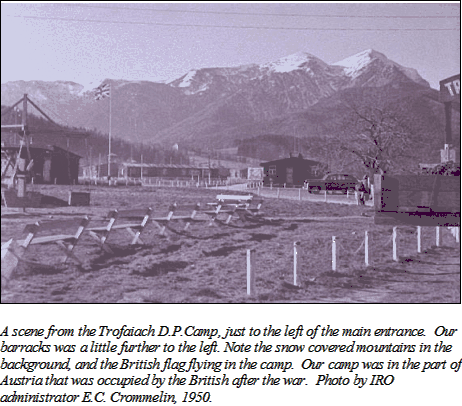 This morning I split firewood. Cilka now thinks I
should take a job in the camp offices so I wouldn't do so much physical labor.
Earlier she had been opposed because she was worried I would be blamed whenever
things went wrong.
This morning I split firewood. Cilka now thinks I
should take a job in the camp offices so I wouldn't do so much physical labor.
Earlier she had been opposed because she was worried I would be blamed whenever
things went wrong.
Friday, March 25, 1949
I received another food package from my
friend Paulin in New York, worth about 100 Schillings. These packages really
help.
Sunday, March 27, 1949
I wrote a reply to Mrs. Edwards in Australia.
I sent her 33 stamps and a lace collar. The postage was 11 Schillings!
Monday, March 28, 1949
I drew patterns for slippers for Cilka and
Janko.
Tuesday, March 29, 1949
We used a Linguaphone (a machine like a
record player) for the first time in our Spanish and English classes this
evening. I can't keep up with the teacher!
Thursday, March 31, 1949
I made slippers for Cilka and Janko.
April
1949
Friday, April 1, 1949
Sun and snow today. This morning I went
shopping for our families in Slovenia. This afternoon, I put together a package
for Cilka's family.
Saturday, April 2, 1949
This evening, we began spiritual exercises;
we prayed till 11:30 p.m.
Sunday, April 3, 1949
We picked some dandelion leaves near the camp
clinic.
Monday, April 4, 1949
For the first time in this camp, I was
attacked by bedbugs. As a result, I slept poorly last night.
We have a new English teacher who seems
better than the one we had.
Tuesday, April 5, 1949
I have bedbug bites all over me. Lice stay
away from me, but bedbugs seem to really like me. This afternoon, I sprinkled
DDT powder.
Thursday, April 7, 1949
It's a year since we arrived in this camp.
Reberšak promised me I could become a camp
policeman whenever one of them leaves for America.
Saturday, April 9, 1949
J. Zupan says I should take over his mail
carrier job when he leaves for America. The job has no official pay, but he's
making 300 Schillings a month from tips.
Tuesday, April 12, 1949
I sent our friend Silva 80 cigarettes to
thank her for the food she's been sending us. The camp continues to provide us
with cigarette rations, which I don't need.
I sent Mihelic the remaining Kocmur photos
from last summer. Last June, Kocmur sent me 685 copies of photos he had taken
in the camp. We had hoped I could sell them to the other refugees at a profit,
but I have not been able to sell them all, and have actually lost money. The
ones that are left are mostly of Croatians. The Croatians in the camp preferred
to buy from a Croatian photographer.
Thursday, April 14, 1949
Our friend Silva sent us ration cards which
will allow us to buy some meat.
Our baby Janko is beginning to walk if we
hold his hand. He made one first step by himself and stopped when he realized there
was nobody holding on to him.
Friday, April 15, 1949
This Sunday will be Easter. Cilka baked a
potica for the Jesenko family, two for us and three for the Erznoznik family.
We received Easter cards from my sister
Julka, Cilka's sister Julka, and letters from my mother and from Cilka's
brother Rupert and sister Manica.
Saturday, April 16, 1949
At 4 p.m., we went to the camp chapel for the
traditional Easter blessing of food. Then we had a wonderful dinner: potica,
klobase, horseradish and tea.
At 6:30 p.m., we had a solemn procession through the camp. I helped carry the baldachin which covered the priest carrying the Eucharist. The Croatians sang poorly, our Slovenian singers sounded much better.
Easter Sunday, April 17, 1949
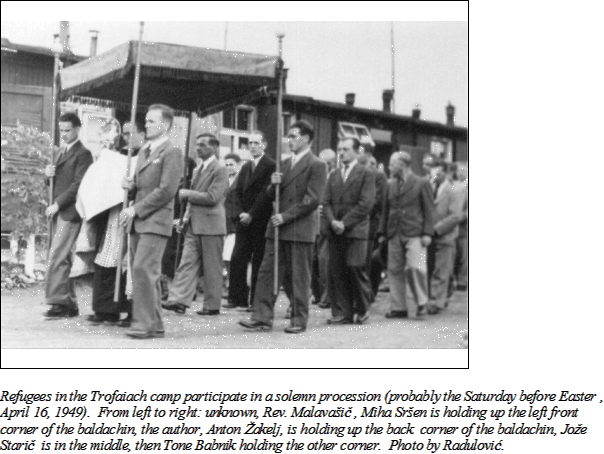
At 9 a.m., we attended Easter
Mass. The camp chapel was packed, and the singing was glorious.
At noon, the camp provided soup with
macaroni, potatoes and pork. Even though we were grateful to get some meat in
our soup, it was a disappointing meal for Easter. Back in our room, Cilka
prepared some potatoes and chicken. I bought a bottle of wine and we had a more
appropriate Easter celebration.
We had our first picture taken with our baby
Janko, who is now 8 months old.
Tuesday, April 19, 1949
We received two dollars from our friend Pavle
Kokelj in Canada. That means he is doing well.
Thursday, April 21, 1949
This morning, we listened to the major speaking
about emigration. He recommended Australia, Brazil, Canada, Venezuela and the
United States. This was my first time in our beautiful new movie theater.
This evening, the staff reviewed each
person's plans for emigration. They are threatening to evict us from the camp
if we refuse to make plans for emigration, or if we are too picky about where
we want to go.
In the camp store, I exchanged some of our points for a coat, shirt, underwear, soap and shampoo.
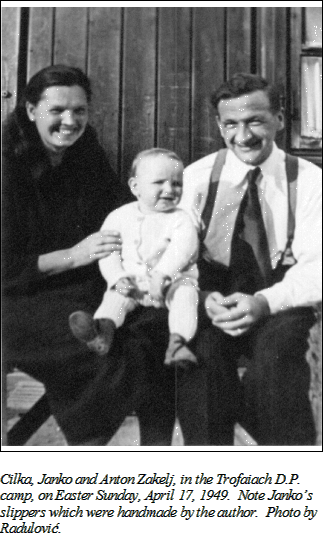 Saturday, April 23, 1949
Saturday, April 23, 1949
I spent my last Schilling to buy some meat.
Sunday, April 24, 1949
A beautiful day. We took our boy for a walk
in the nearby woods; we saw a deer and a rabbit.
Monday, April 25, 1949
216 people left our camp for Australia.
Tuesday, April 26, 1949
I wrote letters to friends. Sold 100
cigarettes for 20 Schillings. Those cigarette rations really help us get by.
Wednesday, April 27, 1949
430 "campers" left for Australia.
I am attending two Spanish classes in case we
have to go to a Spanish-speaking country.
Thursday, April 28, 1949
For the second time this week, I was awakened
by swelling in my eyelids. I don't feel good.
Dr. Klaus gave me 30 Schillings each for my
two dollars.
May
1949
Sunday, May 1, 1949
I gave Jeric a pack of Lucky Strikes to fix
my radio.
Monday, May 2, 1949
The IRO offices will move to Kapfenberg, but we will stay here.
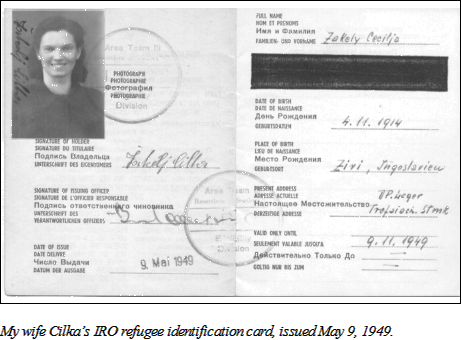 Wednesday, May 4, 1949
Wednesday, May 4, 1949
This evening, we attended another meeting in
the camp hall regarding emigration. For most people, the IRO officials are
recommending emigration to Australia. For us, they recommend getting an
"affidavit" from our brother-in-law Mire in Canada, or from someone
we know in Argentina. Right now, due to my illness, they can't force me to
move.
Mr. Povirk asked the Australian
representative if they have cows and churches in Australia.
Friday, May 6, 1949
Mr. Jesenko was called to meet with the IRO
staff. They demanded that he decide between Australia and Brazil. He said he
would rather go to Argentina.
Saturday, May 7, 1949
This afternoon, we planted lettuce (for the
first time) and red beets.
Sunday, May 8, 1949
The first group left for New Zealand today -
50 people, among them 3 Slovenians and a number of Ukrainians (including Strihacenko
and engineer Pahonov). The train went off the tracks in the Trofaiach station
soon after everyone got on board. They had to move everybody into trucks and
transport them to Leoben, where they boarded another train.
Tuesday, May 10, 1949
We took our son Janko to the clinic for an
exam. He weighs 21 pounds. The doctor recommended lots of fresh air and
Vigantol D (Vitamin D). I am taking Janko for walks in the nearby woods almost
every day. The other day, we saw a beautiful little fawn with spots.
I talked with the farmer who usually sells us
milk. He agreed to lower his price from 2.50 to 2 Schillings per liter. This
will save me 6 Schillings a month.
Wednesday, May 11, 1949
Snow and rain today. I was called to meet with
the IRO staff to discuss emigration to Argentina.
Thursday, May 12, 1949
Again I was called to meet with the IRO
staff. I gave them the address of my friend Ceferin, who emigrated there last
November. They said they will write to him.
Saturday, May 14, 1949
My friend Karl bought his wife Mici a watch
for 467 Schillings.
Monday, May 16, 1949
Jernej Zupan is sick with the mumps, so he
asked me if I could go get the mail for him and distribute it to everyone in
the camp. I ran around doing that from 10 a.m. to 3 p.m.
In the evening, I read my English essay
"My Home Village" to the class. The teacher corrected only a couple
words.
In the evening, Erznoznik, Jesenko and I applied
to emigrate to South Carolina to work on the tobacco plantations.
Tuesday, May 17, 1949
I distributed the mail from 8:30 a.m. to 1
p.m. I ride around on a bike, but it causes my heart to pound.
Wednesday, May 18, 1949
Each day, I'm getting the mail distributed 15
minutes quicker.
Saturday, May 21, 1949
Today, we had rain so I had to walk instead
of bike when I went into town to get the mail.
Monday, May 23, 1949
Tone Seliškar, the Gosar family, and the
Zupan family went to the American consulate in Gradec (Graz) and were accepted
for immigration to the United States. Okorn and some others were not accepted.
I agreed to take over Zupan's job as mail
carrier after he leaves for America.
[Editor's note] To help you understand the
situation, the following are excerpts from Mark Wyman's book, "DPs,
Europe's Displaced Persons, 1945-1951."
There was initially little hope that
America would take in many DPs. President Trumans early moves brought in 40,000
DPs in less than three years, as regular immigrants, but it is noteworthy that
Truman did not propose to go beyond existing immigration laws in 1945 and 1946.
Wheels were starting to turn, however,
slowly and painfully. More and more Americans began to realize that Europes
refugee problems could not end without massive immigration into the United
States. The other possible solutions--large-scale repatriation or assimilation
into overcrowded Germany--were finally seen to be impossible. A Citizens
Committee on Displaced Persons (CCDP) was created in the fall of 1946. ... The
CCDP launched a nationwide campaign to convince the public that DPs would not
take jobs or homes from Americans, that they were neither collaborators nor
Communists, and that only a small proportion were Jews, contrary to widespread
belief.
The fight in Congress was bitter, and
opponents delayed the DP bills passage until the spring of 1948 using "all
the parliamentary tactics of stall, evasion, confusion and deception,"
according to one scholar. At the same time that President Truman signed the
compromise measure on 25 June 1948, he attacked it for combining the worst
features of the Senate and House bills resulting in "a pattern of
discrimination and intolerance wholly inconsistent with the American sense of justice."
Truman said he was signing it, despite its negative features, to allow
resettlement to proceed for the 200,000 DPs authorized to enter over the next
two years ...
...An elaborate system of recruitment was
worked out quickly, known in the U.S. Displaced Persons Commission as "the
pipeline." It carried DP applicants through twenty-two steps, ranging from
medical and skills checks to an FBI investigation and a search among records of
the Nazis' Berlin Document Center. ... The crucial feature of the American
program was the "assurance," a promise from an American sponsor that
a specific DP would be provided housing for his family and employment. (This
was a moral, not a legal, obligation.) Assurances were mainly collected by
voluntary agencies, then approved by the DP Commission in Washington ...
Time spent in the "pipeline"
ran from three months to more than twelve months, depending on the nature of
medical problems (such as old TB scars) or collaboration charges. ...
The chance to move thousands of refugees to America shifted voluntary agencies' operations into high gear ... The organizations pleaded, scrounged and advertised to locate sponsors in the United States. Churches were especially active ...Catholics had a DP resettlement committee in each diocese, usually working with ethnic organizations. ...
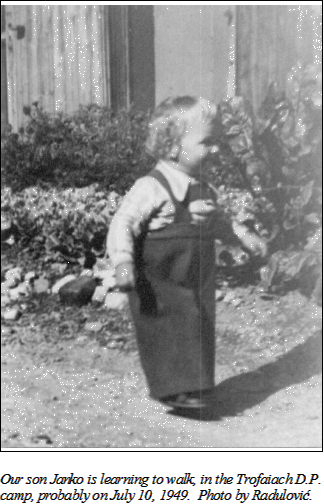 Friday, May 27, 1949
Friday, May 27, 1949
This evening, Zupan and I collected 160
Schillings in tips for distributing mail in the Slovenian section of the camp
and in the transit section (for people passing through).
Saturday, May 28, 1949
I collected only 10 Schillings for delivering
mail to the Croatian barracks.
The Chilean commission accepted only 38
people out of 360 applicants (for emigration to Chile).
Sunday, May 29, 1949
I sold newspapers in the camp, including
"Sunday," "God's Love," "The Carinthian
Chronicle," and "Steierblatt." People tell me I might be able to
make 70 Schillings a month selling newspapers.
This morning, we attended the blessing of the
new scout flag.
This afternoon, we went for a walk in the
woods. Our son Janko really likes these walks and pays attention to every
detail; he notices birds or squirrels quicker than I do.
Monday, May 30, 1949
At 9 a.m., our first large group left for America, including Tone Seliškar, the Jernej Zupan family (5 people), the Gosar family (3 people), Korencan and others, altogether 26 people. I gave Zupan 80 Schillings, some bobbin lace and some postal coupons to write to us when they get to America.
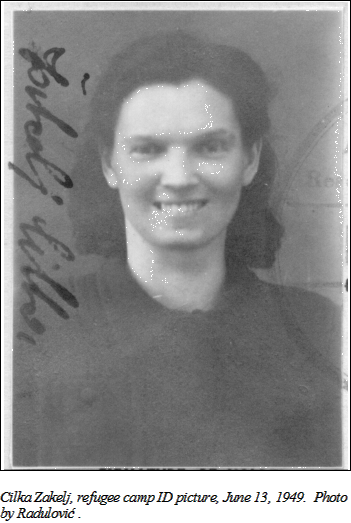 They say that none of the camp staff (including many
of our fellow refugees) will be paid for the month of May, or in the future.
People are very upset and refusing to work.
They say that none of the camp staff (including many
of our fellow refugees) will be paid for the month of May, or in the future.
People are very upset and refusing to work.
The camp food is the worst in 3 years:
nothing but coffee in the morning, bean soup or polenta for lunch, and coffee
or inedible soup for dinner. Is this how they will force us to leave?
June
1949
Wednesday, June 1, 1949
New people are working in the camp kitchen to
replace the people who refused to work due to lack of pay, but the food is
still just as watery. At least they're finally giving me some white bread
again, after not getting any for some weeks.
I've caught a bad cold, probably from riding the
bike when I get the mail. I get hot and sweaty, and then I get the chills.
The Brazilian commission accepted only 35
families.
Friday, June 3, 1949
My friend Ceferin writes from Argentina that
he has arranged an apartment for us. We can move in around July 1.
32 people received an invitation to come to
the American consulate in Gradec (Graz).
I went to a store in Trofaiach and bought
some food which we will cook in our room, including 40 pounds of potatoes, 5
eggs, some oil and some grits. I also received a supplemental ration from the
camp warehouse: some bread, polenta and a little meat.
Saturday, June 4, 1949
Most of the camp staff are still striking,
but I'm distributing mail as usual.
Monday, June 6, 1949
Franc Zupan received a letter from Dr. Basaj which says that John and Mary Brezic have agreed to be our sponsors in America! They are an older couple who want us to help them on their farm in Wisconsin, and maybe someday take over their farm.
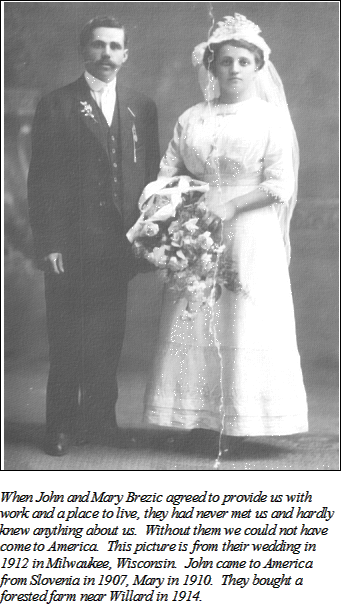 So now we have
a choice: we can go to either America or Argentina. Everyone is congratulating
us about our prospects for America, but I'm still wondering if Argentina might
be a better choice. Maybe it will be easier to sell our bobbin lace in
Argentina. What if I could get easier work in Argentina? I've always been
interested in farming, but I hear that farming in America is much more advanced
than it is here. What if it will be too complicated for me? And I think I'm
probably too slow and too honest for America. But Cilka is worried that the heat
in Argentina will be too hard for her lungs (some years ago, she had a
tuberculosis-like infection).
So now we have
a choice: we can go to either America or Argentina. Everyone is congratulating
us about our prospects for America, but I'm still wondering if Argentina might
be a better choice. Maybe it will be easier to sell our bobbin lace in
Argentina. What if I could get easier work in Argentina? I've always been
interested in farming, but I hear that farming in America is much more advanced
than it is here. What if it will be too complicated for me? And I think I'm
probably too slow and too honest for America. But Cilka is worried that the heat
in Argentina will be too hard for her lungs (some years ago, she had a
tuberculosis-like infection).
Tuesday, June 7, 1949
Levicar is teasing me about becoming an
American farmer. People think we will soon become owners of a farm. I know it won't
be like that.
Wednesday, June 8, 1949
Of the 30 of us who applied to go to America,
all have been accepted.
Thursday, June 9, 1949
This morning, I took the train to Leoben and
went shopping for sandals and a raincoat which I could use when I ride my bike
to get the mail. Nobody had what I needed.
A large group left for Brazil today.
Friday, June 10, 1949
Some of the refugees in the camp were raising
pigs for food. The pigs were all slaughtered today, I think because of hoof and
mouth disease.
Saturday, June 11, 1949
I was a witness today for the marriage of
Štefan Zorc and Joza Zaleznik. I distributed the mail as usual, but became very
tired.
Sunday, June 12, 1949
I went around to some of the barracks and
collected 40 Schillings in tips for distributing mail.
Monday, June 13, 1949
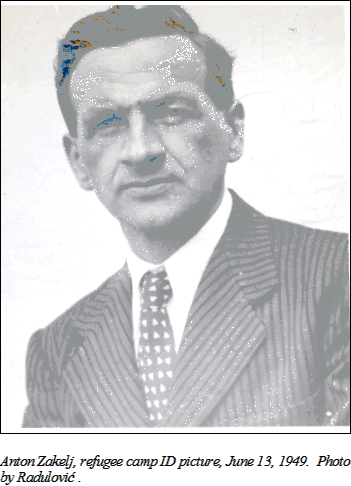 I'm 42 years old today. We went to Mass at 6:30. Cilka
made me a cake for my birthday and gave me a kiss (we don't do that very
often).
I'm 42 years old today. We went to Mass at 6:30. Cilka
made me a cake for my birthday and gave me a kiss (we don't do that very
often).
There was new snow up on the mountains.
Radulovi (a Croatian and fellow refugee) took
our pictures for new ID cards.
Tuesday, June 14, 1949
The photos didn't turn out, so we needed to
retake them.
This evening, people were singing outside our
barracks.
Wednesday, June 15, 1949
At 10 a.m., 58 people left in trucks for
Leoben, and from there on trains to a ship for America. Among them were Joze
Staric, Franc Zupan, Franc Škulj, the Okorn family, and Povirk.
The Australian commission will stay here for
a week. In two days, they have already accepted many applications.
This afternoon, I brought some saplings which
we will use tomorrow as decorations for the procession.
Thursday, June 16, 1949
At 9 a.m., we went to Mass and then we all participated in the traditional procession for the holy day of Corpus Christi. Despite the bad weather and shortage of singers, it was beautiful. Even the Hungarians participated - under the leadership of Rev. Atila.
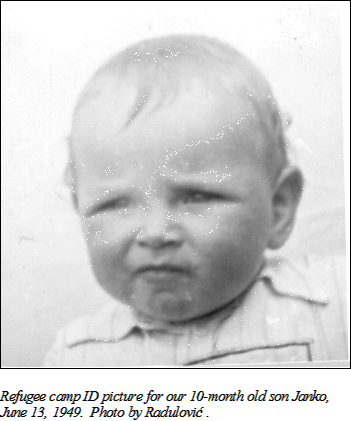 Saturday, June 18, 1949
Saturday, June 18, 1949
I bought new sandals for 57 Schillings and a
bottle of wine for 20 Schillings. On the way to town, my bicycle broke down, so
I had to walk.
Monday, June 20, 1949
I brought a backpack full of packages from
the post office and distributed them in the camp, but nobody gave me any tips
today.
Thursday, June 23, 1949
This evening, many people made bonfires up on the hills, as we usually did
at home on this date, the last day of spring. (Bonfires on this day are a
tradition with many people, but for Slovenians, they are referred to as
"Kres" and they commemorate a time hundreds of years ago when
Slovenians used large bonfires on hilltops to warn neighboring villages about
the arrival of attacking Turks.)
Friday, June 24, 1949
Our friend Karl Erznoznik received a letter and
documents to fill out from the National Catholic Welfare Conference (N.C.W.C)
for emigration to America. He feels very fortunate.
Dr. Maksimoff examined us to see if we are
healthy enough for emigration. He recommended an operation for my varicose veins.
He said my eyesight is good. I did not try to cover up my problems with ulcers.
They took blood samples and injected some vaccine. They also did X-rays and
wanted some urine samples, but neither Cilka nor I could produce any.
Saturday, June 25, 1949
Cilka still does some leather-sewing for
Copi, a nearby shoemaker. He sold me new soles so I could fix my own shoes, and
charged me only 7 Schillings (in the store, I would have paid 22).
Sunday, June 26, 1949
I went walking in the woods this afternoon
with Cilka and Janko. Janko ate wild strawberries with great pleasure.
Monday, June 27, 1949
We received a telegram from our friend Silva,
that she will come visit us next Wednesday.
Rev. Roman (Malavašic) made us extra copies
of our birth and wedding certificates. We have been waiting for emigration
papers from the N.C.W.C. for 3 weeks now. Other people who do not have a
sponsor like we do have already received their papers.
Wednesday, June 29, 1949
I got the mail distribution done by 11:15,
and then newspapers by noon. In the afternoon, I took the train to Leoben to
meet our friend Silva. She brought two suitcases full of wonderful things for
us: potica, lard, cherries, pants for me, an outfit for Janko, and a dress for
Cilka.
For the entire month, I received 355
Schillings in tips for delivering mail. Although the job has no official pay,
the tips add up to more than I could make if I had one of the camp jobs. Mrs.
Cerar gave me more than anyone else, in the hope that I would deliver her mail
first.
Cilka and I continue to use our income as
before: 1/3 for immediate expenses, 1/3 for our families in Slovenia, and 1/3
for savings. We use much of our savings to buy lace that people make in the camp,
because we think we will be able to sell the lace wherever we go.
July
1949
Monday, July 4, 1949
At 1 p.m., we said farewell to the first
refugees from our camp to leave for Chile. There were 216 people in the group,
including Anton Tisel with his wife Martina and Jeric with his family.
Tuesday, July 5, 1949
Hundreds of new people arrived in our camp,
all bound for Australia.
Wednesday, July 6, 1949
A large group - 542 people - left our camp
today for Australia. There were many Slovenians among them, including Lakajnar,
Soko and others.
Friday, July 8, 1949
This evening we went to a meeting in the
Slovenian reading room. Rev. Malavašic had bad news for us. Very few of us will
be allowed to go to America. Argentina will again begin accepting applications,
but we don't know when.
We received a large gift of food and clothes
from American Catholics. Rev. Malavašic and I were chosen to do the
distribution.
Our friend Karl and his family went to
Kapfenberg today to continue the application process for America.
Saturday, July 9, 1949
I distributed letters till 1 p.m., then
newspapers till 3 p.m., and then the American food and clothing till 6 p.m.
Here's how we decided to divide everything among 180 Slovenians: each child
under 14 months received one set of baby clothes and one diaper; each child
under 6 received one box of biscuits and two boxes of dry milk; older children
received a pound of beans and a box of peas; adults received a box of biscuits,
2 boxes of soup and 2 boxes of dry milk. Everyone was happy except one person
who was angry with me because he didn't get what he expected. I distributed
everything according to Rev. Malavašic's list. I considered refusing to accept
the baby clothes for our Janko, but then there would have been a fight about
who would get that. When you're distributing something like this, you can never
please everyone, and they blame you for everything.
Sunday, July 10, 1949
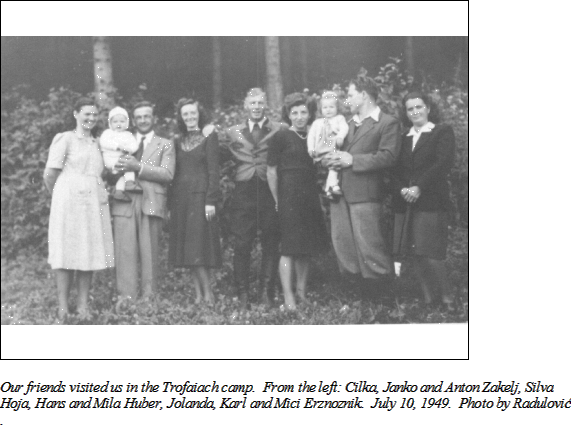
Our friends Hans and Mila Huber arrived by
motorcycle today for a visit. They live in Deutsch Feistritz, a village about
20 miles southeast of here. They said they could get us jobs and an apartment
in Deutsch Feistritz. They don't think we should leave Europe. (We first met
Hans many years ago when he came to Ziri as an Austrian border guard. While
stationed in Ziri, he fell in love with Mila, who lived near Ziri. They married
and returned to his home in Austria.) I turned down their invitation to stay in
Austria because I do not think I could get decent work in Austria. I think the
prospects for decent jobs are much better in America or Argentina.
Radulovi took pictures of us this afternoon,
including Silva (who is still here visiting), and Hans and Mila.
Marjan Filipic was teasing Cilka and Silva,
but Cilka got angry with him. Now all three of them are upset.
Monday, July 11, 1949
Silva went back to her home today, after
visiting us for 14 days. I accompanied her to the train station in Trofaiach
and gave her 10 Schillings and 20 packs of cigarettes for the trip.
Friday, July 15, 1949
We received a package from Silva - 10 pounds of
cherries. Cilka loves them.
Janko was vaccinated against whooping cough.
Rev. Roman (Malavašic) helped me fill out
some papers -for emigration to America. Now people are saying that Argentina
will not accept any families with children - only single adults up to age 37
and married couples up to age 40.
Saturday, July 16, 1949
I paid Radulovi 55 Schillings for 9 photos of
us with Silva, and 16 of us with Silva, Mila and Hans. I sent 3 photos to Mila
and 6 to Silva.
Sunday, July 17, 1949
I signed up for a pilgrimage to the shrine at
Maria Zell for next Sunday.
Wednesday, July 20, 1949
It's cool. The bedbugs were biting me all
night.
Saturday, July 23, 1949
Cilka has been working in Copi's shoemaking shop
the last few days. I was in the camp workshop repairing her shoes.
Sunday, July 24, 1949
At 7 a.m., about 90 of us, including
Slovenians, Croatians, and Volksdeutcher, left on trucks for a pilgrimage to Maria
Zell, about 50 miles away. (But Cilka and Janko stayed at the camp.) At 9 a.m.,
we stopped at the See-Pass, at an altitude of 4,000 feet. At 11 a.m., we
reached our destination, after traveling through the mountains, across many
very steep and winding roads.
Maria Zell is a modern, tourist village. But
our primary destination was a 700 year-old church located on the hillside above
the town. The inside of the church was stunningly beautiful. Rev. Malavašic
said Mass at noon, accompanied by Slovenian singing.
After Mass, we had lunch at the "Golden
Ox." The lunch cost 10 Schillings, and we didn't have to use any ration
cards! At 2 p.m., we toured a mechanical Nativity scene which they told us is
the largest in the world. At 3 p.m., we went to Slovenian litanies to the
Blessed Virgin Mary. Four men led the singing from the altar, with the entire
church responding to each refrain. It was deeply moving for all of us.
At 5 p.m. we left for the return journey to
the camp. The weather was beautiful all day. I rode in the open truck behind
the cab. Despite my warm clothes, I felt very cold.
I missed my wife and little boy during the
entire trip. I wanted to buy them some souvenirs, but everything seemed
terribly expensive.
At 7:30, we arrived back in the camp. The
Hungarians in the camp were waiting for us and they greeted us with singing.
Monday, July 25, 1949
As I went to the post office to pick up the
mail, I felt a growing pain in my back, but I continued with my usual mail
delivery.
Tuesday, July 26, 1949
This morning I couldn't get up; my back was
stiff and painful. Cilka went to get the mail for me and brought it back to our
room. I sorted it out on the bed and then Cilka took it out to each of the Slovenian
barracks. I distributed the rest to the other barracks in the afternoon. When I
got back to our room, I warmed my back with an electric heater which I had
bought from Štefan Zorc for 20 Schillings.
Wednesday, July 27, 1949
My back still felt stiff, but I distributed
the mail in the Croatian and Ukrainian sections of the camp. In the afternoon,
I went to the clinic, where they gave me some anti-neuralgic tablets and 30
minutes of heat treatments. Back in my room, I warmed my back some more with my
electric heater.
Thursday, July 28, 1949
Cilka helped me distribute the mail in the
Croatian and Ukrainian sections of the camp.
The IRO in Kapfenberg sent us an invitation
to apply for emigration to America. This afternoon, I worked on the forms, but
couldn't finish. Here's an example of some of the questions and my replies
(this is all translated from German):
Question #40: Why did you leave your
homeland, and why have you not returned? Answer: Refugee from communism.
#41: Don't you want to return to your
homeland and why not? Answer: No. Life in communist countries is uncertain and
the people are mean.
#42. Provide a short history of your
life. Answer: For my first 25 years, I lived with my father, including 10 years
as a shoemaker's apprentice. In 1929 and 1931 I served as a draftee in the
Yugoslav army. During the Great Depression in 1932, I attended business school
in Ljubljana. After I graduated from business school, I was employed as an
accountant at the shoemakers' cooperative in Ziri. I continued there until
1943, when the partisans made further work impossible. From the fall of 1943 to
the spring of 1945, I was the accountant for a shoe factory which was
established in Kranj by a group of shoemakers who had moved there from Ziri. After
the war, I fled from my homeland because, as a democratic man, I felt that life
under communist rule would be impossible.
At 4 p.m., I was called on to help Karl and
his family complete similar forms.
Since I am one of the few people in the camp
who has documents showing my family history going back for a number of
generations, I am often called upon to be a witness for people who have no
identity papers. Without proof of identity, they cannot emigrate anywhere.
Friday, July 29, 1949
At 9 a.m., we said farewell to the third
group to leave for America. This group had 64 people, including Štefan Zorc,
his wife Joza and their 11-month old daughter Marija.
It was hot today, with a thunderstorm in the
afternoon.
Saturday, July 30, 1949
Cool. My back is feeling a little better. I
haven't gone to English class all week.
Sunday, July 31, 1949
Warm again. I worked on the emigration forms
again. I wasn't sure what to put down for race. I put down "white."
August
1949
Monday, August 1, 1949
At 6:30 a.m., Cilka, Janko and I, and the
Jesenko family boarded a train for Kapfenberg, to the American offices of the
IRO. We finished our business at the IRO between 8:45 and 9:30 a.m., and then
made arrangements for pictures and our return to the camp. On the way back
through Leoben, I picked up 2 copies of Janko's birth certificate. By 12:30, we
were back in the camp. Janko was calm through the entire trip. He enjoyed
looking at the horses, cars, motorcycles and other things as we passed by. In
Kapfenberg, we had to do some walking. Although my back still hurts, I still
walked faster than Cilka, and much faster than Mrs. Jesenko (who is 4 months
pregnant). Janko sometimes walked on his own, but mostly we had to carry him.
Tuesday, August 2, 1949
I went to the clinic again for my back. They
had me lie down in the special electric heater. I fell asleep and woke up 30
minutes later, wet from sweat.
Thursday, August 4, 1949
I received a letter from my brother Joze in Slovenia, Yugoslavia. He says our brother Ciril and his wife Ivica have been in prison for 14 days. Which prison and why? Their infant daughter Marjetica has been moved to relatives in Ziri.
(We learned later that the police took them
from their home without notice, leaving Marjetica home alone. Friends came by
and cared for their daughter until relatives arrived. As was typical in
communist Yugoslavia at that time, the charges were vague, something like not
cooperating with the government.)
The letter also says that our sister Julka
lost her job in the factory because she used up all her vacation taking time
off for church holy days. As punishment, they may give her a job somewhere
where she won't even get Sundays off.
Monday, August 8, 1949
My back is back to normal, so I no longer
need help distributing the mail. Cilka did a good job helping me the past 14
days.
Tuesday, August 9, 1949
Today our English class was in the woods near
the camp.
Saturday, August 13, 1949
There was new snow in the higher elevations in
the nearby mountains. Cool.
Monday, August 15, 1949
At 7 p.m., Slovenians from the camp sang in
Trofaiach, and then again at 9 p.m. in the camp chapel, under the direction of
Bore Erman. Very nice.
Wednesday, August 17, 1949
I bought a large German-English dictionary
for 40 Schillings.
Thursday, August 18, 1949
I used up all my points in the camp store and
bought a second suit.
Friday, August 19, 1949
Malka Povirk left for America.
Saturday, August 20, 1949
Karl received an invitation to visit the
American consulate in Kapfenberg on Aug. 25; they say that he and his family
will leave for America a week after that.
Monday, August 22, 1949
Cilka and Karl went to Leoben to buy eyeglasses.
They will ask the IRO to reimburse them. They also bought a bicycle part and a
thermos bottle to mail to my brother Joze in Slovenia.
Thursday, August 25, 1949
Karl and his family went to Kapfenberg and
back today. They received approval to emigrate to America in one week.
Friday, August 26, 1949
Karl and I began building shipping crates for
the trip to America. We obtained some boards and metal strips to hold them
together. The boards are from barracks in the camp that are being torn down as
more and more refugees leave for other countries.
Monday, August 29, 1949
I wrote a number of letters to friends and
relatives, and received our first letter from our sponsors in Willard,
Wisconsin. He is 65 years old and his wife is 58. They have 100 acres of
farmland and 24 cows. They've been waiting for us for a long time. Why haven't
we received approval to emigrate yet?
Wednesday, August 31, 1949
This month, I collected 520 Schillings in tips for distributing mail in the camp, plus I made 50 Schillings selling newspapers.
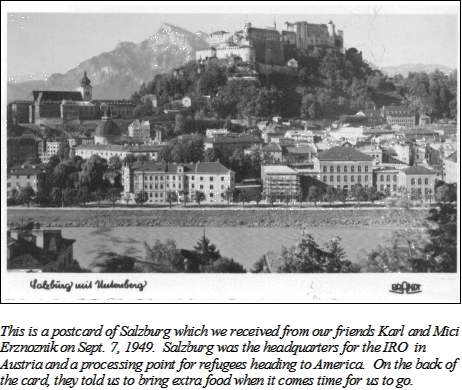
September
1949
Thursday, September 1, 1949
At the post office, I met Mr. Veigl, with
whom we did business before the war. He was a salesman for an Austrian company
that sold special sewing machines for shoes. Just before the war began, he was
at our shoemakers' cooperative trying to convince me that Germany had no
intention of occupying Yugoslavia.
Hans and Mila Huber arrived by motorcycle
this afternoon and visited with us for two hours.
From 7 - 9 p.m, , I went to English and
Spanish classes. An Englishman from the Linguaphone company was also there.
Friday, September 2, 1949
At 9 a.m., about 50 people left for America,
among them our good friends Karel and Mici Erznoznik with their 2-year old daughter
Jolanda. Mici was crying because Jolanda had become sick from a vaccine. Karel
had been excited about leaving for America, but today he was more subdued.
After they left, everyone competed to carry
off what was left in Karl and Mici's room. Karl had quite a supply of firewood.
The Austrian police now have a permanent station in our camp.
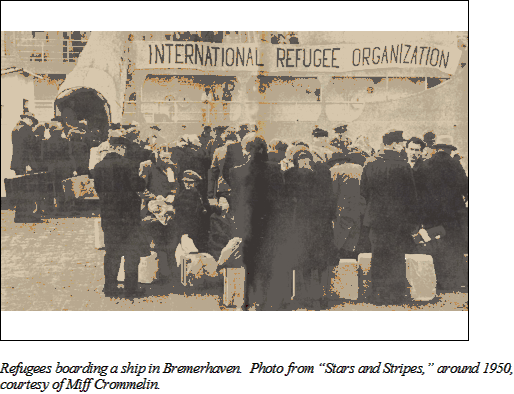
Saturday, September 3, 1949
This afternoon I repaired shoes. In the
evening, I went around collecting contributions for my letter carrier duties. I
collected 150 Schillings.
Sunday, September 4, 1949
I wrote a letter to our sponsor, Ceferin, in
Argentina. We still don't know if we will go to Argentina or America.
Monday, September 5, 1949
Our English class is done because the teacher
no longer has time to teach us.
Tuesday, September 6, 1949
I sent a 20 pound package to Cilka's mother
in Slovenia. Hot today.
The Sršen family received word yesterday that
they have a sponsor in America. The Lunder family received a similar notice
today.
I bought 2 pounds of margarine for 8
Schillings and 1 pound of pork for 24 Schillings. For many years in the refugee
camps, we had to eat potatoes with little or no butter or margarine. Now we
finally have enough, partly because our friend Silva sent some extra ration
cards.
Arl and Kamenšek moved into Karl's room.
Friday, September 9, 1949
A large number of new refugees arrived in the
camp, on their way to Australia.
Saturday, September 10, 1949
435 people left for Australia, among them
only one family that we know - Šepetovec.
Sunday, September 11, 1949
I wrote my first English letter to our
acquaintance Paulin in New York.
Tuesday, September 13, 1949
More new refugees arrived, this time on their
way to Canada.
This afternoon, I cut and shaped the leather
uppers for new shoes for our 1-year old son Janko.
Wednesday, September 14, 1949
56 people left for Canada. All afternoon I
helped Mojse and his two sons complete their emigration forms. He paid me 7
Schillings.
Thursday, September 15, 1949
Our friend Karl Erznoznik writes from Bremen.
They will soon board a ship bound for America from nearby Bremerhaven.
Friday, September 16, 1949
A large group left the camp for America
today. There were no Slovenian acquaintances among them but I knew a Ukrainian,
Fesenko, and his wife.
Saturday, September 17, 1949
This afternoon, I continued making new shoes
for our son. Today I sewed some of the leather together by hand.
We had expected a visit from the American
consul today, but he never came.
Sunday, September 18, 1949
About 100 Croatians from our camp made a
pilgrimage to Maria Zell today. They are working on a monument to commemorate
our rescue from communism.
Monday, September 19, 1949
We went to see a movie in Trofaiach, Das
Lied von Bernadette (The Song of Bernadette). I was very satisfied - it
was beautiful.
The camp staff tell me I will no longer
receive a ration of white bread, but I will still get some macaroni and milk.
Tuesday, September 20, 1949
I worked on the shipping crates for our trip
to America or Argentina.
Wednesday, September 21, 1949
Our friend Marjan Filipic drew a nice sign
and nailed it to our door. It says Mail. (I'm still delivering
mail throughout the camp every day. I usually go into town to pick it up before
8 a.m., and I get it all delivered by 10:30 a.m.)
In the evening I helped Miha Sršen complete
forms for the National Catholic Welfare Conference. He paid me 10 Schillings
for one hour of work.
Thursday, September 22, 1949
Both our son Janko and I have a cold.
Friday, September 23, 1949
This afternoon I was summoned to Father Atila's room. Someone stole his radio when he was out this morning. Since I delivered the mail this morning, they think I may have seen the thief, or perhaps stolen it myself. I had to show them exactly how I slid the mail under the door.
 Saturday, September 24, 1949
Saturday, September 24, 1949
Still no invitation to visit with the
American consul about our emigration plans. What is the problem? Our sponsors
in America have been waiting for us for a long time already.
Sunday, September 25, 1949
This afternoon, 4 families left for Chile.
I took Janko walking in the woods, as I do
almost every day. But today he was sick and didn't feel like walking.
We heard on the radio that Russia
successfully exploded an atom bomb.
I sold the remains of Cilka's bicycle for 15
Schillings.
Monday, September 26, 1949
Before he left for America, my friend Karl
had applied to the health insurance fund for reimbursement for the glasses he
had bought. I went to Leoben today to see if that had been arranged yet. It had
not.
I bought a bicycle inner tube for 12
Schillings, some paper and some shoemaking supplies.
Tuesday, September 27, 1949
From 5 p.m. to 2 a.m., I filled out
immigration forms for the Sršen family. I completed 10 forms in 9 hours.
Fischinger completes 4 forms in 6 hours.
[Editor's note] The following excerpt from
Mark Wyman's book, "DPs, Europe's Displaced Persons, 1945-1951"
provides an interesting description of the paperwork that was involved in
applying for emigration to America:
DPs soon found the American requirements
and paperwork to be a frightening quagmire, and many still recall their
frustration. Some could find a grim humor in the situation: One DP was asked
whether he would be willing to join the U.S. Army. He said he would. Then the
Immigration officer asked, "If, while in the Army, you had a chance to
capture Stalin, what would be the worst punishment you could give him?"
The DP shot back: 'Id bring him here to (the DP camp) and make him go through
processing for emigration to the States!"
There was truth behind this humor. A
resettlement officer once laid out the documents in a single case file for
entry to the United States: they stretched seventeen yards.
Wednesday, September 28, 1949
122 people left for Australia.
Others are receiving their American visas,
but nothing for us. I wonder if we're in trouble because I tried to hide my
ulcers. I like my mail carrier job here in the camp, but now that we've decided
to leave, I don't want to wait any longer.
Friday, September 30, 1949
This month I earned 482 Schillings delivering
mail, and when you add in what I earned selling newspapers, it comes to 630
Schillings. Last year, I never earned that much when I was toiling with a
pickaxe on sewer construction. This year I spend less time working and I don't
work as hard.
October
1949
Sunday, October 2, 1949
Although it was raining, I went to the post
office, picked up the mail and delivered it in two hours.
Tuesday, October 4, 1949
I put together a package for my sister Mici
and brother Joze in Slovenia - things that I bought here, but are hard to get
there, such as writing paper, soap, macaroni, matches, film and clothes.
I filled out immigration forms for the Cerar
family from 8 to 11 p.m.
Thursday, October 6, 1949
I received our third letter from our sponsor
Brezic in America. We should have left some time ago, but there's still no visa
from the consul. It looks like we will have to wait another 2 - 3 weeks. I'm
worried that I may be developing gout, and that will affect our ability to
leave.
I wrote back to Brezic, and to our friend
Karl.
Sunday, October 9, 1949
Today was Election Day in Austria. There is a
lot of interest in the outcome. I brought 57 newspapers to the camp and sold
them all.
I took Cilka and our 14-month old son Janko
to the children's theater. I think he prefers the merry-go-round.
Monday, October 10, 1949
In yesterday's elections, the People's Party
won fewer seats than before (77 vs 85), while the Nazis won more (16 vs. 0).
The People's Party will have to work with the Nazis to be able to govern,
unless the Nazis are disqualified. This is a disaster for the People's Party.
Wednesday, October 12, 1949
Cilka sewed leather for the shoemaker Copi
today. I stayed in our room and took care of our son.
Friday, October 14, 1949
58 people left our camp for America, but no
Slovenians among them.
Cilka worked with the shoemaker till 6 p.m. I was angry that she came back so late, and she was offended that I was angry.
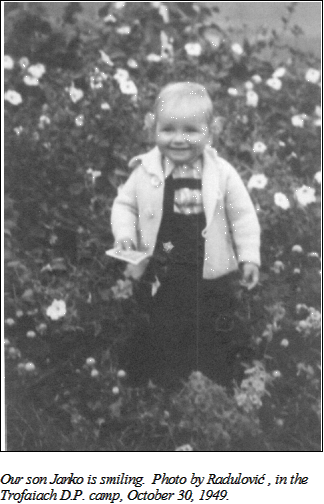 Saturday, October 15, 1949
Saturday, October 15, 1949
This afternoon, I repaired Cilka's shoes.
White bread is available for sale without
ration cards! Meat is available for 6 Schillings per pound with a ration card,
and 10 Schillings per pound without a ration card. The price of shoes has gone up
from about 90 Schillings per pair to 150.
Tuesday, October 18, 1949
We forgot to include Miha Sršen's parents in
his emigration application. They're worried they will have to wait and go
later.
Wednesday, October 19, 1949
I pulled up the red beets we had planted near
our barracks. They're nice and fat.
The IRO says their work is being extended 6 -
9 months longer than expected.
Our son Janko is constantly sick.
Friday, October 21, 1949
Yugoslavia was accepted into the United
Nations. We don't feel that a country that has taken away our homes and killed
our friends and relatives belongs in any international body.
Sunday, October 23, 1949
Cilka, Janko and I took a long walk today.
Janko saw a stream for the first time; he just gazed at in wonder.
Monday, October 24, 1949
It's 3 years since Cilka and I got married,
and 6 years since the partisans (communists) came to our home village.
To celebrate our wedding anniversary, I bought
some meat and a bottle of Vermouth. Cilka baked a potica.
Tuesday, October 25, 1949
Our friend Janez Levicar says we will all be
able to return to our homes next spring. I think it will be at least 3 years.
Wednesday, October 26, 1949
168 people left the camp for Australia,
including Arl.
Friday, October 28, 1949
A large group left the camp for America,
including Toncka Kunovar, Franc Bizjak, Andrej Mojzej, and two Ukrainians for
whom I had helped fill out emigration forms two weeks ago.
We have new snow; the mountains are all
white.
Sunday, October 30, 1949
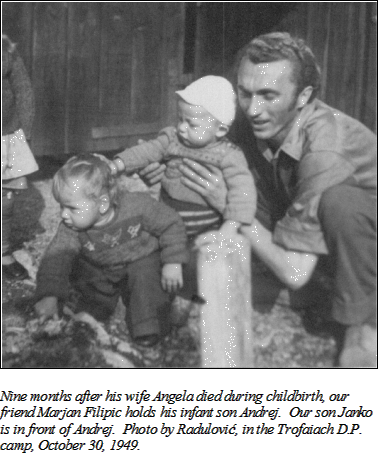 Cilka, Janko and I walked to the Turmhause. Radulovi
took 3 pictures of us.
Cilka, Janko and I walked to the Turmhause. Radulovi
took 3 pictures of us.
November
1949
Tuesday, November 1, 1949
For All Saints Day today, we had a special
Mass at 8 a.m. with 8 altar boys, and then another service in the evening with
10 altarboys. Unfortunately, all our good singers are gone, and today's singing
was not very good.
In the afternoon, we went to the cemetery
with our friend Marjan Filipic, whose wife died during childbirth earlier this
year. Today Marjan placed some beautiful decorations on his wife's grave. Our
son Janko observed everything very carefully.
Wednesday, November 2, 1949
At 7:20 a.m., Cilka, Janko and I took a train
to Kapfenberg for new pre-emigration medical examinations, because the exams we
had 4 months ago are no longer valid. After examining us, Dr. Korošec said we
are healthy enough to go to America, and we will receive an invitation from the
consul next week. The probable reason for the past 4 months' delay was Cilka's
tuberculosis-like infection 11 years ago. But the doctor can see that is no
longer a problem. We will probably leave for America at the end of this month!
I had begun to doubt that we would ever go to America, but now I am feeling
hopeful again.
We returned to the camp at 2:30. Bore Erman
had already taken care of the mail for me.
Sunday, November 6, 1949
It's 4 days since we saw the doctor and still
no invitation from the consul. They tell me to wait another week.
This morning it was raining, so I walked to
town to pick up the mail instead of riding bike like I usually do. I don't
think I will do that on a Sunday again!
Tuesday, November 8, 1949
One of our fellow refugees, a Hungarian
engineer named Josef von Handl, is accused of spying for the communists.
My upper false teeth broke into two parts -
after 8 and a half years of wear.
Wednesday, November 9, 1949
I went to the dentist in Trofaiach in the
morning and again in the evening, but he was too busy to see me.
Thursday, November 10, 1949
The dentist repaired my broken false teeth
and added two new teeth for 50 Schillings.
This afternoon we finally received an
invitation to see the American consul on November 16! I am worried that I will
become sick before then and they won't accept me.
Friday, November 11, 1949
I collected donations for my mail
distribution in the Ukrainian part of the camp, but didn't receive much.
In the afternoon, I repaired shoes with Zupancic.
He fixed my boots. He charged me 97 Schillings, but I gave him 130.
Monday, November 14, 1949
Bore Erman will take over my mail carrier
duties when I leave. He accompanied me to the post office today and started
learning more about the job.
Wednesday, November 16, 1949
At 7:20 a.m., a group of us from the camp
took the train to Kapfenberg. First we saw the doctor (again!), then they took
our fingerprints, and then we finally met with the American consul. I had to
swear that everything I had written on our forms was the truth. Then he shook
my hand and wished me luck. Finally, we have approval - we will be going to
America!
Although I never really wanted to go to
America, now I feel fortunate that we will go. The others are very envious, especially
because our sponsors sound so perfect.
We had to wait an extra hour at the consul's
office because there was some concern regarding Rihtar's grandmother. They told
her she might be able to go to America by airplane instead of by ship, and that
someone else might be able to go with her.
Thursday, November 17, 1949
I wrote letters all morning, making
arrangements for our departure.
Monday, November 21, 1949
I went to the train station in Leoben to meet
our friend Silva, who brought lots of good food, clothes for Janko, and 10
dollars for my bicycle and radio. I bought 5 American dollars from a friend for
28 Schillings each.
Tuesday, November 22, 1949
Today is Cilka's 35th name day. We celebrated
at noon with soup, roast chicken, potatoes, lettuce, wine, potica and cookies.
The rest of the day we made preparations for our trip to America. They tell us
we will leave on November 25.
Wednesday, November 23, 1949
I packed up the radio for Silva and made arrangements
for that and my bicycle to be shipped to her home in Austria. Silva helped me
sort through the letters I had received in the camps during the past 4 years.
Thursday, November 24, 1949
I bought some new shoes for Janko for 58 Schillings.
The ones I made for him are too small, so I gave those to the Jesenko family.
Even though I haven't packed anything for our
trip yet, I'm feeling happy.
This morning we each got another vaccination.
I went to the camp store and exchanged most of our remaining points for
clothes. Then I went to the camp offices and said farewell to the workers
there, including Hilda Jung and Frank Lorber.
Hilda Jung is a pleasant young lady who has
been working in the camp offices. She's the daughter of a tailor who was also a
former member of the German SS troops. She has a beautiful figure and a pretty
face with black, velvet eyes. When I deliver mail, she's always hoping I'll
bring a letter from her boyfriend. When I bring one, I like to tease her and tell
her I don't have anything for her. When I finally give her the letter, she's
never angry.
I also said farewell to Frank Lorber, who has
been working in the camp office. (He was the director for a while.) In
Slovenia, he was the manager of a stocking factory. The first time I met him
was when he came out to tell the women who were working in the garden that it
was time to come in for lunch. He stayed out and continued their work. (Some
years later, he moved to Cleveland and I helped him get work at Risher's. He
was a very hard worker. Even though he was highly educated, he was willing to
take on any kind of work.)
In the evening from 9 - 11, we said more
farewells to our friends in the camp, including Levicar, Dr. Erman, Rebernak,
Rev. Kokelj, Šankal and others. The Cerar, Sršen and Rihtar families (who will
all be going to America with us) sang songs. Some of us drank wine. We ate
bread, klobase, cookies and candy. I tried some coffee liqueur.
From 11 p.m. to 1 a.m., I continued to make
preparations for our trip. I couldn't sleep because Janko was crying due to
pains from his vaccination.
Friday, November 25, 1949
Today is the day we leave the camp for our
trip to America. I woke up at 5 a.m. and went to Mass at 5:30. Then I returned
seven I.R.O. blankets to the camp store, keeping five for our trip. At
breakfast, they gave us some rye bread, butter and coffee, and three one-day
food ration packets for each of us to take on the trip.
By 8 a.m., I finished packing all of our
shipping crates and suitcases. I had made two wooden shipping crates, each one
about 2 feet high and 2 x 3 feet wide. In them I packed the most valuable
things we had accumulated over the past 4 years, such as my bobbin lace
designs, a large quantity of lace we had made and saved for sale in America,
the pots, pans and containers we had made of out of downed warplanes, and
various tools, including the woodcutting saw which I had made in the camp. I
used large screws to seal the crates.
I sold our kitchen stove, shelves, table,
chairs, potatoes and beets to other refugees in the camp. Sršen had a
particularly nice woodstove and various shoemaking machines which he decided to
take along, hoping that he could use them to make a living in America.
Babnik has a job lined up in New York at a wage of one dollar per hour, which seems unbelievably high to us. He cut up his steel bed frame so he could pack it and bring it to America, just in case we get stuck somewhere without a bed to sleep in.
At 8 a.m., they loaded our heavier items onto
trucks and at 8:30 they began loading the lighter items and the people. Some
people cried, but I didn't let myself think about that.
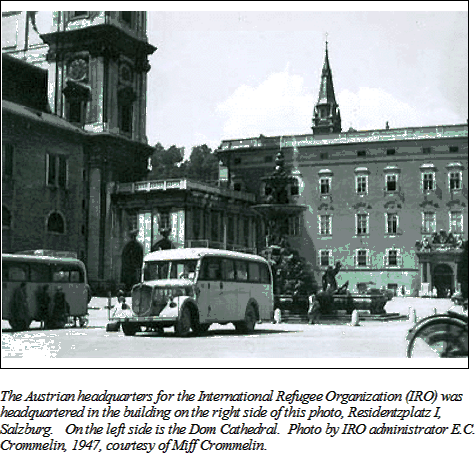 At the last moment, Zupancic brought me the new shoes
which he had been making for me. I gave him 200 Schillings for them, but
unfortunately, they don't fit well.
At the last moment, Zupancic brought me the new shoes
which he had been making for me. I gave him 200 Schillings for them, but
unfortunately, they don't fit well.
The IRO trucks took us to the nearby train
station in Trofaiach. I was assigned to be in charge of the group and provided
with the official papers which I am to turn over to the Americans in Salzburg.
By 10 a.m, we transferred everything to the regular train that runs to Leoben.
Altogether, there are 88 of us, including a few more refugees and an IRO
officer (Englander) who joined us in Leoben. In Leoben, they disconnected our
railcar from the Trofaiach train and connected it to the faster train that will
take us to Salzburg.
It was a mostly cloudy day, with a little sun
and no rain. Our group includes the following families: Sršen, Rihtar, Cerar,
Semanjuk, Raits, Djacenko, and Babnik. As we passed through Schladming, I
thought about how my brother had to work there in the German Arbeitsdienst
at the beginning of the war. That work assignment then led to him being drafted
into the German army and a long, difficult time in Russia. If he had not
cooperated, they would have forced our parents to lose their home.
Along the way to Salzburg, the train stopped
in each town. At each stop, there were vendors selling tobacco, candy and
snacks. Our locomotive was powered by coal with heavy black smoke pouring from
the stack. We could see that they were converting some of the tracks and trains
to electric power.
We reached Salzburg at 7 p.m. We were
transferred onto trucks along with our lighter baggage and transported to the Lechner
barracks, about 10 minutes away. Mr. Raits and I went to the registration
barracks, where we found an IRO worker named Pibernik, who happened to be from
Ljubljana. In German, he asked me where I was from. I told him "Slovenia,
Yugoslavia." Then he replied, in Slovenian, "Where?" I said
"Ziri," and he said "Ah, a shoemaker!" He gave us our room
assignments and told us what to do. Mr. Raits and I went back to the group,
explained the instructions, and we all went to the assigned barracks and picked
out beds. At 8 p.m. we returned to registration and received ration cards for
milk and food, and two blankets per person. Since I had brought five for
myself, Cilka and Janko, we now have 11 blankets. We won't be cold!
All the men had to go back to the train
station to load our heavier baggage onto trucks. Although I had injured my
hand, I helped as much as I could.
At 9:30 everyone went to bed.
Saturday, November 26, 1949
Our 15-month old son Janko woke up first
around 7 a.m., and then everyone else. The IRO staff gave us coffee, and then
some food for the next three days: white and rye bread, butter and milk. I
think we have more food than we will need.
Most groups leaving for America have been
going through Bremen (in northern Germany) and boarding ships at Bremerhaven,
but the IRO staff are telling us that the transition barracks at Bremen are
full and we will probably go through Naples and onto a ship from there.
We waited all morning for the American
consul, but he didn't arrive. So I decided to take Janko for a short walk in
Salzburg. He was awed by all the large vehicles. I tried to buy some postcards,
but the stores were all closed.
At noon, they fed us lunch, including soup,
potatoes and meat with gravy. It was good and there was enough of it. Nobody is
hungry here.
Finally in the afternoon, the American consul
arrived and we were called back to registration. The consul saw people
individually and got up to number 390 by 5 p.m. Since my family is numbers 421
- 423, we were asked to return tomorrow morning at 8.
For dinner, they gave coffee to the adults
and hot chocolate to the children. Afterwards, I wrote postcards to our friends
Milica and Levicar, back at the camp, to let them know we had arrived safely in
Salzburg. People went to bed at 9.
Our son Janko doesn't sleep in the evening
and often gets up at 6 a.m. Even though he wakes the others up in the morning,
everyone likes him because he is the smallest and not afraid of anything.
Sunday, November 27, 1949
Cilka got up at 5:30 a.m. and went out to
look for a church, but couldn't find one. At 7 a.m., I went out with her and we
found a chapel where they were just saying Mass. There were a large number of
nuns in the chapel.
From 9 - 10 a.m. we met with the consular
official. He asked me why I had been in the Yugoslav army (I was drafted), when
I was born, and whether I can read. This was all in German, and I had to read a
German paragraph. Then we went to see a doctor. Janko cried when he saw the
doctor's white coat (I think it reminded him of the many vaccination shots he's
received during the past months.) The doctor weighed Janko (26 pounds), checked
his eyes, throat and genitals. Everything was in order!
For lunch, we had soup, potatoes, and meat
with gravy just like yesterday. In the afternoon, we went for a longer walk in
the city, along one side of the river to the sixth bridge and then back along
the other side of the river. We saw many beautiful store windows, some new
buildings and many ruined buildings - remnants of the bombing during the war.
We also saw beautiful bridges, colonnades, pigeons and hundreds of gulls. The
gulls would catch pieces of bread that were thrown in the air 6 feet above us.
Monday, November 28, 1949
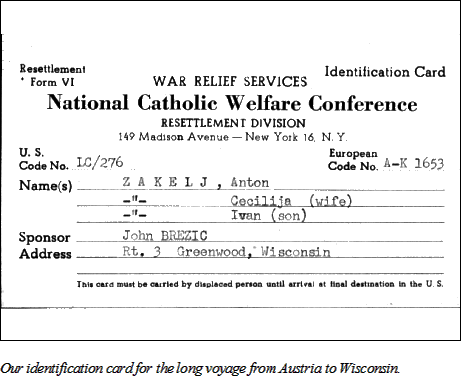 I woke up at 7:30. We are not allowed to do any
cleaning; we've been told that is for the workers. However, later this morning,
Sršen and I helped unload coal and firewood for our barracks.
I woke up at 7:30. We are not allowed to do any
cleaning; we've been told that is for the workers. However, later this morning,
Sršen and I helped unload coal and firewood for our barracks.
In the afternoon, I took two letters and five
postcards to the post office. I wrote to Karl in America, Mire in Canada, to
Cilka's mother and others. We returned 6 blankets to the IRO and helped load
our baggage back onto trucks. At 7 p.m. we were all waiting outside, ready to
leave. We were divided into three groups of 24, and continued to wait until
9:30.
Some of our friends from Trofaiach, including
Raits, Zemljanj, Mišcenko, Dr. Gole and Pecavar are staying here to wait for an
airplane or train to take them to a ship which will go across Panama and then
to California.
Finally at 10 p.m., we were taken to the
train station, where we boarded a special IRO refugee train. We are sharing a
compartment with the Sršen family. Miha Sršen arranged a bed made out of
suitcases for our wives Kati and Cilka, their daughter Katka and our son Janko.
Miha and I lay down on the luggage racks. That meant Janko couldn't see me and
so he started crying. I became angry at the entire world. Why do we force
innocent children to wander homeless like this?
It's drizzling outside as we continue to wait
for the train to leave.
Tuesday, November 29, 1949
Around midnight last night we fell asleep. At
2 a.m., our special IRO train finally left Salzburg. At 7:30 a.m., we passed
through Innsbruck. For breakfast we ate the bread and canned American meat they
gave us in Salzburg. At 9:15 we reached the snow-covered Brenner Pass. (The
Brenner Pass is on the Austria-Italy border, at an elevation of 4,500 feet,
with nearby mountains reaching 10 to 12,000 feet.)
At the Italian border, customs officers asked
us about cigarettes and radios. They checked luggage in other compartments, but
not ours. I talked with a revenue officer and exchanged my 12 remaining
Schillings for Lire.
At 1 p.m., we got off the train and got a
quick lunch - bread and soup with cabbage. At 2 p.m., the train continued
further through the gorgeous South Tyrolean countryside. The weather was
beautiful. Earlier, when we were coming down from the Brenner Pass, we could
look back and see our train twisted behind us like a snake. Now we entered flat
terrain, all covered with fruit trees for miles!
At 4 p.m. we reached Balzano with its countless vineyards. We could see that the city had been heavily bombed during the war. From Bolzano to Trento I marveled at the orchards of fruit trees, all neatly cared for.
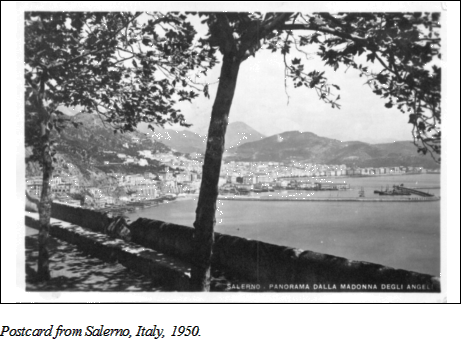 Wednesday, November 30, 1949
Wednesday, November 30, 1949
At midnight last night we traveled through
the city of Verona. I woke often through the night, but still managed to get
some good sleep.
At 9 a.m., we stopped at a large station far
outside Rome. The weather continued to be beautiful. On the other side of a
fence I saw orange trees with blossoms and ripe oranges. How I wished I could
have one!
I'm feeling good, but open sores have
appeared on my face, just like when we were camped outdoors over four years ago
in Vetrinje. I think they were caused by the dirty water in Salzburg. We only
had one washbasin with a small amount of water, and we used the same water for
our son's bath and my shaving. Now I'm washing my face with brandy and I can no
longer shave. I look and smell like a gypsy.
Around Rome we saw lots of new construction.
After we left Rome we saw vineyards and orange trees with white blossoms and
red fruits, and then olives in the flatter areas and on the terraces.
At 11:30 a.m., Cilka was the first one to see
the Mediterranean. At 1:30, we reached Naples, where we got off the train for a
couple hours.
At 5 p.m., we reached the Pontecagnano
station near Salerno. There were already 5 trucks waiting for us. After a
five-minute ride we arrived in camp San Antonio, where we will stay until we
can a board a ship for America. We went through registration, where the men
were separated from the women and children. Cilka and Janko went to barracks
#33, I went to #15, where I fell asleep at 9:30.
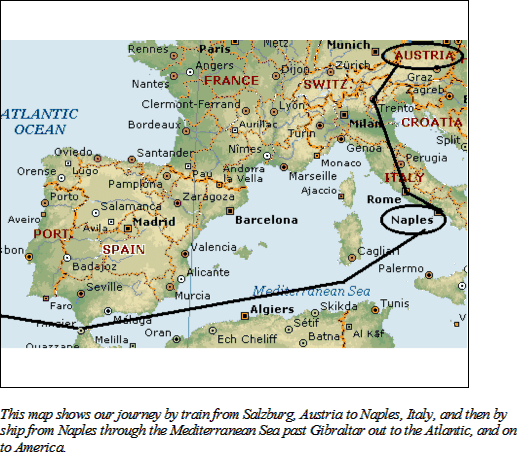
December
1949
Thursday, December 1, 1949
After a good sleep, I woke at 7 a.m. After I
shaved, I washed with brandy, which I think is helping me get rid of the sores
on my face. For breakfast they gave the adults white bread and coffee, and for
the children, biscuits and milk.
For lunch the adults had soup, macaroni and
potatoes, and the children got rice and potatoes. It was good and there was
enough of it.
I sold 40 cigarettes at 8 Lire each, which I
then used to buy 3 postcards, a pound of almonds and half a pound of grapes.
Everything costs about 20 times as much as it did in Austria.
Friday, December 2, 1949
Again I woke at 7 a.m. - after a long cold
night. I took some bread and milk to Janko and got some coffee for myself.
In the morning, we took a walk around the
camp. At 2 p.m., we were visited by an American Slovenian from the National
Catholic Welfare Conference, who gave us some buttons with their organization's
symbol on them. I got some firewood for the women's barracks. Then I took a
bath. In the evening we went to the chapel.
Saturday, December 3, 1949
I got up at 6 a.m., and went to Mass in the
chapel at 6:30. Janko got another vaccine shot. The sky turned cloudy, but
warm.
This morning a group boarded a ship for
Australia. People are saying that, next Monday, we will either go straight to a
ship, or to camp Bagnoli near Naples.
For lunch today, we had soup and macaroni.
For supper, soup again, potatoes and cauliflower.
Sunday, December 4, 1949
At 8 a.m., we went to Mass. There was
Slovenian singing, but I had to go outside with Janko because he couldn't sit
still.
At 10:30, we went to another medical
examination. Cilka said I've been spoiling Janko. If he's not with me, he cries
and does not like being with her.
Tomorrow morning we leave for camp Bagnoli
near Naples.
Monday, December 5, 1949
I slept poorly last night and got up at 4:15
a.m. We don't have clean water for washing. We got everything packed and got
ourselves onto trucks at 6:45 a.m. At the train station, we got a nice
compartment with the Sršen family in a new Italian train. At 9:50 the train
left for Naples.
Along the way, we saw the effects of recent
flooding: beautiful orchards and vineyards were destroyed. The tracks were
damaged in some locations so the train had to move slowly. We reached Naples at
11:30. We could see people rebuilding factories that had been destroyed in the
war.
At 1 p.m, we reached camp Bagnoli: huge
buildings, former military barracks, located on the bluff overlooking the
harbor.
At 3 p.m., another medical exam. The doctor immediately
ordered me to the clinic because of the open sores on my cheeks. He said I
won't be able to leave if I don't get better in three days. At the clinic they
bandaged my face and my leg, which I had injured while loading our shipping
crates. The clinic visit delayed me long enough to miss supper. Those damn
crates!
Again, the women and children were separated
from the men. Sršen and I slept on some mattresses in a hallway in Block L,
while our women and children were in Block D.
Tuesday, December 6, 1949
I didn't feel good today. I think it might be
the canned beef liver I ate yesterday. I went back to the clinic this morning
for additional treatment of the sores on my face and the injury on my leg. I'm
worried that I won't heal enough to be allowed to leave.
In the afternoon, Sršen, Babnik and I went to
the canteen and drank half a liter of wine (70 Lira).
Wednesday, December 7, 1949
I slept better last night and I feel better.
At 7:15 a.m., we went to Mass in a church nearby which has a Slovenian priest.
For breakfast, they gave us milk and bread.
At 8 a.m., I tried going to the library to
read newspapers, but it was closed. I can't find any newspapers anywhere.
The clinic gave me some new cream for my
sores.
Cilka and I took Janko to a playground, but
he was restless. We could have gone on a tour of Pompeii or Capri, but it costs
1,000 Lira.
They tell us that our ship may be leaving on
December 11. If everything goes well, we may be in Wisconsin for Christmas.
Thursday, December 8, 1949
Today is the holy day of the Immaculate
Conception. I went to Mass at 7 a.m., and Cilka went to a solemn Mass with
singing in Slovenian and Latin at 9. After that, we were together all day. We
tried cooking some tea , without success. Finally, I went out and bought a
quarter liter of wine.
Around noon, they posted a list of people who
will leave for America on the "U.S.S. Greeley" on December 11. There
are 1,280 people on the list, and we are numbers 617-619!
In the evening, we went to Slovenian litanies
at the nearby church, but the priest was not a very good singer.
Friday, December 9, 1949
At breakfast this morning, the staff told us that
the men will need to do some work in the camp today. I helped from 8 - 11 a.m.
and 1 - 5 p.m.
Saturday, December 10, 1949
I slept poorly. I went to Mass at 7, and then
to the clinic at 8:30 a.m. At 2 p.m., the doctor finally determined that I was healthy
enough to go to America!
Janko got an ID necklace in case he gets lost
during the trip.
The ocean looked stormy all day. Wind and
rain. Will the ship leave in this type of weather?
For lunch, I opened a can of meat that I had
been saving for three years. I didn't feel good after I ate it.
I wrote letters to our sponsors in Wisconsin,
to our friend Paulin in New York, and postcards to my father in Slovenia and
our friend Marjan Filipic, who is still in the Trofaiach camp. The postage cost
me 250 Lira.
In the evening, there was an announcement
that 70 people were removed from the passenger list. That caused a great deal
of worry, but it appears there are no Slovenians among those who were removed.
Sunday, December 11, 1949
Most people got up at 3 or 4 a.m. to prepare
for departure. I was the last up at 4:30. At 6 a.m., we had breakfast. Then we
returned the blankets they gave us when we arrived here, and everyone gathered
in the theater. They divided us into groups of 100 and then into groups of 40
to board trucks.
At 11 a.m., we boarded a large ship, the
"United States Transport Ship General Greeley." At 1 p.m. we had our
first meal on the ship: soup, meat, peas, potatoes, pudding, bread and tea. The
portions were small, but good.
At 1:30, the ship left Naples. It had been
raining all morning, but by the time we left, the weather cleared.
Sleeping quarters on the ship are separate
for men vs women and children. It was hard to find the cabin that Cilka and
Janko were assigned to. I helped them and we finally found cabin #33, which
they have to share with 2 - 3 Jewish/Polish women. The cabin looks nice, but
the Polish women do not seem friendly.
When I brought Cilka's suitcase to her cabin,
Janko was crying "Papa, papa!" so we all went up to the upper deck.
The sea has been calm, but by evening we were
all feeling a little seasick.
I am assigned to dormitory F5 which includes
111 beds in the lowest level of the ship. We share one bathroom with deck E,
and it's always occupied. So I use the bathroom near Cilka's cabin instead.
The ship has 6 passenger decks, with Deck A being the upper deck, and Deck F being the lowest passenger deck. Below Deck F is another level for storage.
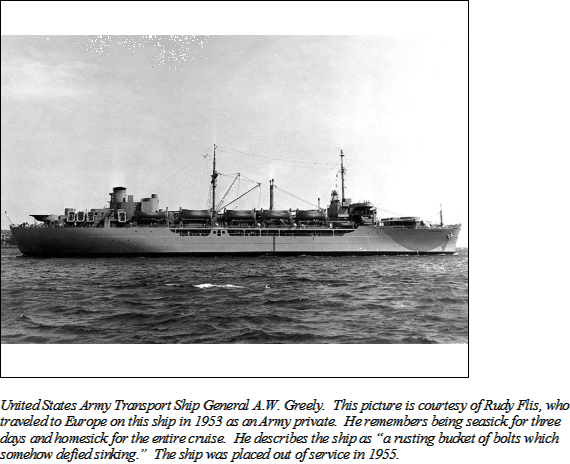
Monday, December 12,
1949
I slept well. At 6 a.m. we went to Mass in
the ship's meeting hall on Deck B. Many people missed it because the clocks
were changed as we traveled into a new time zone.
At 7 a.m. I went to breakfast. I ate only the
hard-boiled egg and put the apple and orange in my pocket for later.
After breakfast, I went to the upper deck
where I found Cilka and Janko and many others. There was a strong wind and high
waves. I felt cold, even in my winter coat. Many people were leaning over the
railing, throwing up, and there were many others who were not able to get to
the railing quickly enough.
At 10 a.m., I helped Cilka and Janko back to
their cabin. Janko cried for a while, then fell asleep. I went to the ship's
clinic to have them look at my injured thumb. I had torn the nail a couple days
ago, but I didn't want to tell anyone, for fear that I wouldn't be allowed to
leave. I talked with an American doctor in English. He cleaned my injury, and
put on some ointment and a bandage.
Cilka had been very worried that, with my
stomach and ulcer problems, I would not do well on an ocean voyage. But
yesterday, she started feeling seasick before I did. This morning, she didn't
want to eat. While I was in the breakfast line, I thought about eating her
portions, but by the time I got to the food, I wasn't feeling very well either.
My brother-in-law Mire had written us, telling us that we will be less likely
to become seasick if we eat a lot. But I'm finding that the more I push myself
to eat, the worse I feel.
At noon, I went to lunch, but I was throwing
up and feeling too seasick to eat anything at all. I decided to just not eat
and stay quietly in bed. I tried taking a pill for seasickness, but I threw
that up too.
This morning, we passed an island. I'm not
sure if it was Sardinia, Corsica or Baleari. They tell us we traveled 384 miles
today. At 9 p.m. we went to bed. The sea is steadily becoming more agitated.
Tuesday, December 13, 1949
I slept poorly. The ship was heaving all
night. At 4 a.m., I jumped up, thinking that the ship had hit a mine. I could
hear terrible noises from the kitchen - porcelain dishes were crashing to the
floor. (This was repeated many times during the rest of the trip.)
I got up at 7 a.m., but soon returned to bed.
The sea was so wild that announcements were being made on the loudspeakers,
telling everyone to stay in their cabins. If you went out, there was a great danger
of being hit by falling objects. But it didn't seem much safer to stay in bed,
either. In the dining room, any tables and chairs that were not fastened down
were destroyed. In the clinic, large bottles of medicine broke. In the kitchen,
hundreds of dishes broke into pieces.
During the storm, I didn't go to Cilka and
Janko at all. I felt that I couldn't help them, and I hoped that it would soon
be over.
At noon, the sky cleared and the sea became
calm. I felt better and went to lunch. I had soup, pork, potatoes, bread,
blackberries and tea. Then I found Cilka and Janko - with the Sršen women and
children, in their cabin. Cilka said she went to Sršen's because one of her
cabinmates was expecting Cilka to be her maid and do whatever she demanded. Cilka
said she just couldn't stand it any longer.
The afternoon was nice. We saw many ships,
and as we passed Spain, we saw snow-covered mountains.
Today, we traveled 412 miles. The entire trip
is 4,392 miles, so we have 3,980 miles to go.
Wednesday, December 14, 1949
I slept better, but dreamed a lot. I woke at
6 a.m. The clocks were moved back another hour as we traveled through another
time zone. They say we passed Gibraltar at 2 a.m., which means we are now in
the open Atlantic. We may reach New York on December 23.
At 10 a.m., I went back to the ship's clinic. The ship's doctor changed the bandages on my injured thumb, and referred me to an older doctor, a fellow passenger, for the eczema on my cheeks. The older doctor drew some blood from my finger and injected it into my thigh. The younger, ship's doctor was puzzled by this. (I learned later that this practice was considered to be a remedy for disinfection a long time ago, before penicillin was available.)
This morning, the ocean became rough again.
My seasickness returned and I was not able to eat lunch or supper. I was just
thirsty.
During the past 24 hours we've completed 372
miles.
Thursday, December 15, 1949
Again I had many dreams. After breakfast I was
assigned to work in the lowest section of the ship. They say that any man who
does not work at least three days during this trip will not be allowed on land.
I went to the lowest section of the ship but it was so stuffy that I couldn't
breathe. They sent me to the labor office, where I waited in vain for two
hours.
In the afternoon, I helped take care of
Janko, who is sick with diarrhea. I've been eating so little that I feel very
weak. Today I skipped lunch and dinner. At breakfast the past couple days, I've
saved the hard-boiled egg they gave me, thinking I would eat it later. A day
later, it was still in my pocket, going bad, so I threw it overboard.
Cilka and Janko have been spending their days
in Sršen's cabin, but sleeping in the cabin assigned to them with the Polish
Jewish women. I had angry words with the woman in Cilka's cabin who was
treating Cilka like a servant and not allowing her to open the window for fresh
air. Now the window is usually open.
There a large number of Poles on the ship,
and the announcements over the loudspeakers are usually in Polish, beginning
with "Uvaga, uvaga!"
We've completed one-third of the trip. Will
we make it alive to New York?
This evening I was terribly thirsty. After I ate
a slice of apple I felt much better.
Friday, December 16, 1949
I got up at 6 a.m. At 8 a.m. I went to Mass,
where I saw a large group of Franciscan priests and brothers.
I worked all day with a Jewish man in the
ship's cold storage area. He was very angry that the other people from his
group weren't working. I saw lots of good food in cold storage - poultry, pork
and other food, but all I wanted was an apple. I found a crate of green New
Zealand apples and I stole one. It was very good.
I asked a huge black cook if I could have
something to drink. He gave me a can of grapefruit juice, which I had never
tasted before. I brought it back to Cilka and we all thought it tasted so
bitter that we couldn't drink it. (We forgot that we had some sugar along. With
that sugar, we could have turned that juice into an excellent drink.)
Around noon today, we traveled past the
Azores Islands. The air was clear, so we had a good view of the islands with
their airport and radio station.
Janko has been eating very little. Whatever
he does eat comes out quickly, either as vomit or diarrhea. I'm catching a
cold.
Today we completed 402 miles.
Saturday, December 17, 1949
This morning I worked in the "crew
bedrooms" with a Slovenian. They fed us good coffee, an orange, lemon and
bread. In the afternoon, I swept hallways. My "boss" documented my
work. I still need confirmation from the labor office that I have completed my
work requirements.
In the evening, Slovenians performed a little
concert on the upper deck in honor of a leader of a religious order.
The ship provided us with coupons we can use
to buy things. I used some to buy two pairs of socks, shaving blades and some
other things.
Today we completed 398 miles; we still have
2,054 miles to New York.
Sunday, December 18, 1949
I went to Mass at 6 a.m., Cilka at 8. Janko
is usually too restless to be with us at Mass, so one of us takes care of him
while the other goes to Mass.
This morning we had to take all children under
three years old to the doctor. Janko is still sick.
We've been on the ship for a week and we're
still alive. Today the ocean was rough again, so I didn't eat breakfast or
lunch. After supper I went straight to bed. I woke up after a while, thinking
about how we will probably not make it to Wisconsin by Christmas.
Monday, December 19, 1949
This morning I went to see the doctor again
regarding my injured thumb. This afternoon I worked in the ship's butchershop,
where I helped sort poultry and pork. We threw all the chicken necks and wings
into cans to be thrown overboard; likewise with the smaller pieces of fat from
the pork. If only we could have had these pieces of meat when we were in the
camp!
Today, we noticed that Janko (now 16 months
old) is teething. The doctor said that may be why he's been so sick. Janko was
feeling better today, though he's lost a lot of weight. Cilka has a bad cough,
but she refuses to see a doctor.
Whenever Janko starts feeling better, we have
to keep a close eye on him, because he likes to wander off and talk with
everyone he meets. The people all like him.
Tuesday, December 20, 1949
Today I worked in the butchershop more than 6
hours. I could have had any meat I wanted, but all I took were some scraps of
cooked gristle, and I think that made me feel sick later. They didn't give us
anything to drink. I saw a crate of Coca-Cola, but I didn't know what that was.
I noticed that a foreman often checked to make sure all the bottles were still
there.
When I was cleaning the foreman's bedroom, I
noticed that the storm last week had tossed a bottle of ink around the room.
There was ink all over the walls.
Today we completed 402 miles, for a total of
3,520 since we left Italy. Subtract that from 4,278 and we have 758 miles to
go. They say we will reach New York around noon on December 22.
Wednesday, December 21, 1949
I got up at 6:30 and went to the doctor. Then
I took care of Janko while Cilka cleaned her cabin. After that I cleaned the
toilet for my dormitory. It was terribly soiled and plugged.
This afternoon the weather was beautiful, so
we went up on Deck A, the upper deck. I weighed myself and noticed that I had
lost 15 pounds during this voyage (going from 147 pounds to 132.)
In the evening, the staff distributed our
visas and other documents.
Thursday, December 22, 1949
Everyone knew that today would be the day we
would reach New York. Many people got up at 3 or 4 a.m., but I waited till 5
a.m. I put on my best clothes for the first time since we left Europe.
I went to Mass, then breakfast, and then 15
minutes more work in the butchershop, in my nice suit.
At 8 a.m., I looked through the fog and saw
the outlines of dry land: it was the New Jersey shoreline. There were many
boats and ships, and hundreds of gulls. I was amazed by the unbroken line of
autos traveling along the shore. They were all rushing to the south. Was it a
huge funeral or something like that? I also noticed some half-sunken ships and
military bunkers on shore. Did they have a war here?
We watched as the crew threw packages of food
overboard from our ship. During the past couple days, the weather was nicer and
we were feeling better, but hungry and thirsty. We would have been so
happy to get some milk and bread, but they wouldn't give us any.
At 9 a.m., we entered the New York harbor
area. Finally at 10 we caught sight of the Statue of Liberty and the Manhattan
skyscrapers.
At 10 o'clock a boat came to the ship with a customs officer and a number of
medical officials. There was no need for X-rays, they could see right through
our stomachs.
In the afternoon, we stepped on dry land. We didn't stop at Ellis Island -
it was just going through decommissioning. They arranged us in alphabetical
order and brought each person's baggage, including the shipping crates that I
had made in the camp.
I was worried I would have to pay customs duties for the lacework we had
brought with us. I talked to a priest about this, and he assured me that
everything would go smoothly. When the customs officer came to us, the priest
sent a pretty young woman to distract him. The customs inspection went well.
There were some Jews who had larger crates
filled with valuable paintings by well-known artists. They had to open everything
up for the customs officers.
We were greeted by women in grey uniforms - I think they were the Daughters of the Revolution. They served us coffee and donuts. I wished they had not taken the holes out of the donuts! If I hadn't been so embarrassed, I would have gone back in line many times (maybe I did). Later, we saw a man selling food in many languages - an apple, a piece of bread and I think small cups of coffee - for a dollar. I bought food for all three of us and spent as much as I had earned in three days of hard labor in Austria. At these prices, the few dollars that we received from the National Catholic Welfare Conference for the trip will be gone too soon.
It was already night when they put us on
busses and drove us through Manhattan to the train station. I looked out from
the bus and tried so hard to see the tops of the skyscrapers that I developed
quite an ache in my neck. I wondered how the driver could distinguish the
stoplights from all the other lights - everything was covered with red, green
and blue lights. (We were not used to Christmas lights.)
We had to wait about an hour at the train
station. I used this time to look for a loaf of bread for about ten children -
ours, Sršen's and Rihtar's. The grownups were hungry, too. But there were no
loaves of bread to be found anywhere - just sandwiches, so thin you could see
through them and expensive as saffron.
A gentleman walked around us a number of
times and looked us over. Finally he came to me and gave me a couple dollars,
and suggested I buy some candy for the children. I was grateful, but I would
have been much happier with a loaf of bread.
Around 11 p.m. we boarded the train. It was a
New York Central train, with large, shiny, new aluminum cars. On the inside end
of each car was a large mirror made of ground glass; stenciled on the mirror
was a map of the railroad's routes all across America. To us, this train
represented the greatness and comfort of America, just as Europe was
represented by the old, small wooden cars that brought us from Salzburg to
southern Italy.
In spite of our hunger, we soon fell asleep
and did not see the first part of our new homeland.
Author's closing comments:
Although we never wanted
to leave our home in Slovenia and come to America, we are thankful to God that
we did. After we came, we were able to send help to our families in Slovenia
for many years. They were forced to live in a communist "paradise"
where many things were lacking, and they appreciated all the help we sent. But
sadly, we could not send them the one thing they longed for more than anything
else - freedom.
Zakelj Diary
Home Page: http://bbhhs96.dyndns.org/~zakeljdiary/